

57 Narrative Writing Prompts For 4th Grade
Journaling is an important part of self-exploration and deep thinking. Giving students a list of prompts to choose from allows them to choose which parts of themselves to explore, and helps keep their writing headed in a certain direction.
Below, you’ll find a list of narrative writing prompts to inspire your students to reflect on their thoughts and feelings.
Using These Prompts
Writing prompts are great because they give struggling writers a sense of direction, but they also help more skilled writers explore thoughts and feelings that they might not have thought of before.
Here are a few ways you can use these prompts in your classroom:
- Challenge students to pick one or two prompts a day for an entire week.
- Create a spinner using a cut-out circle and a paper clip, and have students spin to see which prompt they’re going to use.
- Keep these prompts nearby for students to use when they have spare quiet time in class.
- If you sense a student struggling emotionally, recommend using one of these prompts to help them reflect on these feelings.
The Writing Prompts
- Describe your ideal field trip.
- Write about a special memory that you will never forget.
- Describe your style. Do your parents choose how you dress or do you choose your own clothes?
- You wake up this morning with wings. Describe what happens next.
- What kinds of books do you prefer to read? List some examples.
- Write about a conflict you had with a friend. How did you resolve the situation?
- Rewrite your favorite children’s story, but make the main character a superhero.
- Describe the most frightening dream you’ve ever had.
- How do you entertain yourself when you don’t have access to screens and devices?
- Write about your favorite family tradition.
- There’s a classroom in your school that is always locked with its lights off. One day, you walk by and the door is ajar. What happens next?
- Write about a role model you have, and describe how they’ve affected your life.
- Describe the ideal snow day.
- Have you ever lost something important? What happened next?
- What is the most important lesson you’ve learned this year?
- Think of a time when you were very irritated. Explain why, and then explain how you resolved it.
- What is the best part of the school day? Why?
- What would you do if you were the principal for the day?
- Write a story about someone who wakes up and realizes they’re microscopic.
- Why is it important that people help others?
- Describe something you’ve learned recently. Was it easy or difficult to learn?
- Write a story from the point of view of someone meeting you for the first time.
- Are you good at keeping secrets? Explain.
- Describe a time when you stood up for yourself.
- Describe a time when you stood up for someone else.
- What is your favorite thing about your best friend?
- Explain your favorite board or card game to someone who has never played it before.
- Write your plans for the perfect weekend.
- A harmless but wild animal wanders into your classroom. How does your class react? What happens next?
- You wake up and realize that you can speak to your pet. What do you talk about?
- Describe a time when you participated in a contest.
- Write about the perfect summer day.
- Tell a story about two people who switch jobs for a day.
- Write about something that makes you laugh.
- Why is patience important? Do you consider yourself a patient person?
- Do you think boys and girls are actually different from each other? Explain.
- Do you enjoy writing? What is your favorite thing to write about?
- Write the story of how you met your best friend.
- Describe what you hope your life is like 10 years from now.
- Describe what you hope your life is like 20 years from now.
- Are you an introvert or an extrovert? Explain.
- The plant on your teacher’s desk suddenly sprouts a strange fruit. What is it? What happens next?
- Do you have a funny or interesting story about losing a tooth? Write about it.
- Write about a time when you shared a special meal with your family.
- What would you do if you woke up tomorrow in your favorite video game?
- If you were to describe your best friend as a color, what color would they be? Why?
- What is your favorite food? Why do you like it?
- What is something that you worry about at night?
- Make a list of ten things you love about yourself.
- Write a story from the point of view of your shoes.
- Write about a time when you gave in to peer pressure.
- Describe the last time you got hurt. What happened?
- Tell a story about a time when you got caught doing something you weren’t supposed to.
- Which person in your family are you most similar to? How are you alike? How are you different?
- Describe a time when you felt embarrassed.
- Invent a new sandwich. Write about how to make it, and try to convince others to try it.
Looking For More?
Whether you’re looking for writing prompts or classroom resources, our site is your one-stop destination for making your classroom run more smoothly.
We are home to writing resources, premade forms, and much more! If you’re looking for something specific and can’t find it here, let us know.
We’re here to help your classroom run more smoothly so you can spend more time shaping the minds of the future.
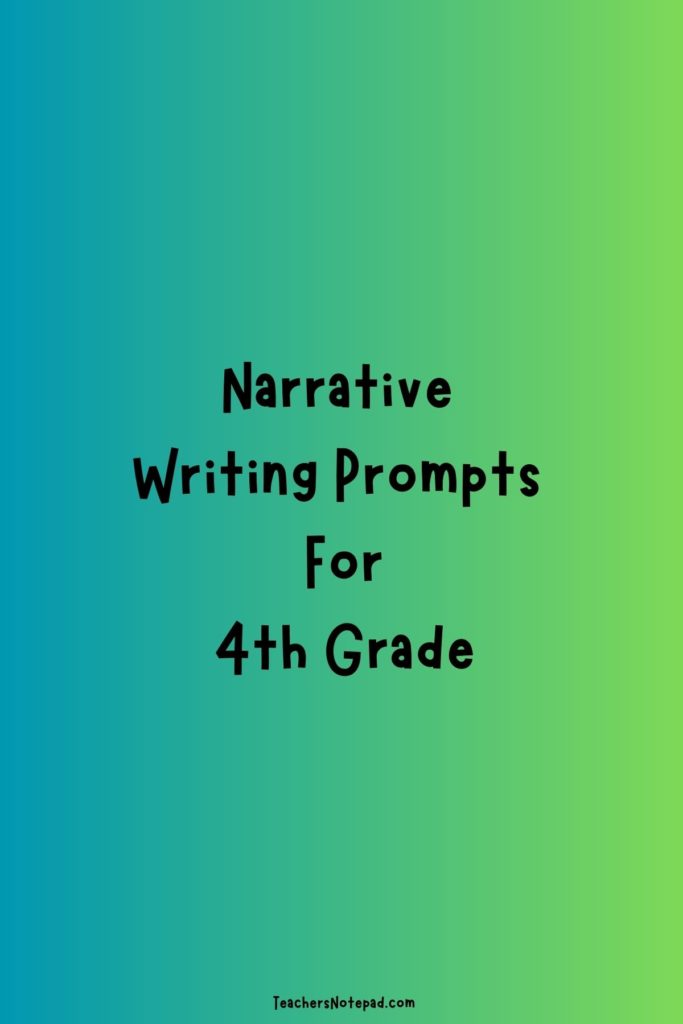
- Grades 6-12
- School Leaders
FREE Poetry Worksheet Bundle! Perfect for National Poetry Month.
101 Exciting 4th Grade Writing Prompts for 2023 (Free Printable!)
Use them for journal writing, essay topics, and more!
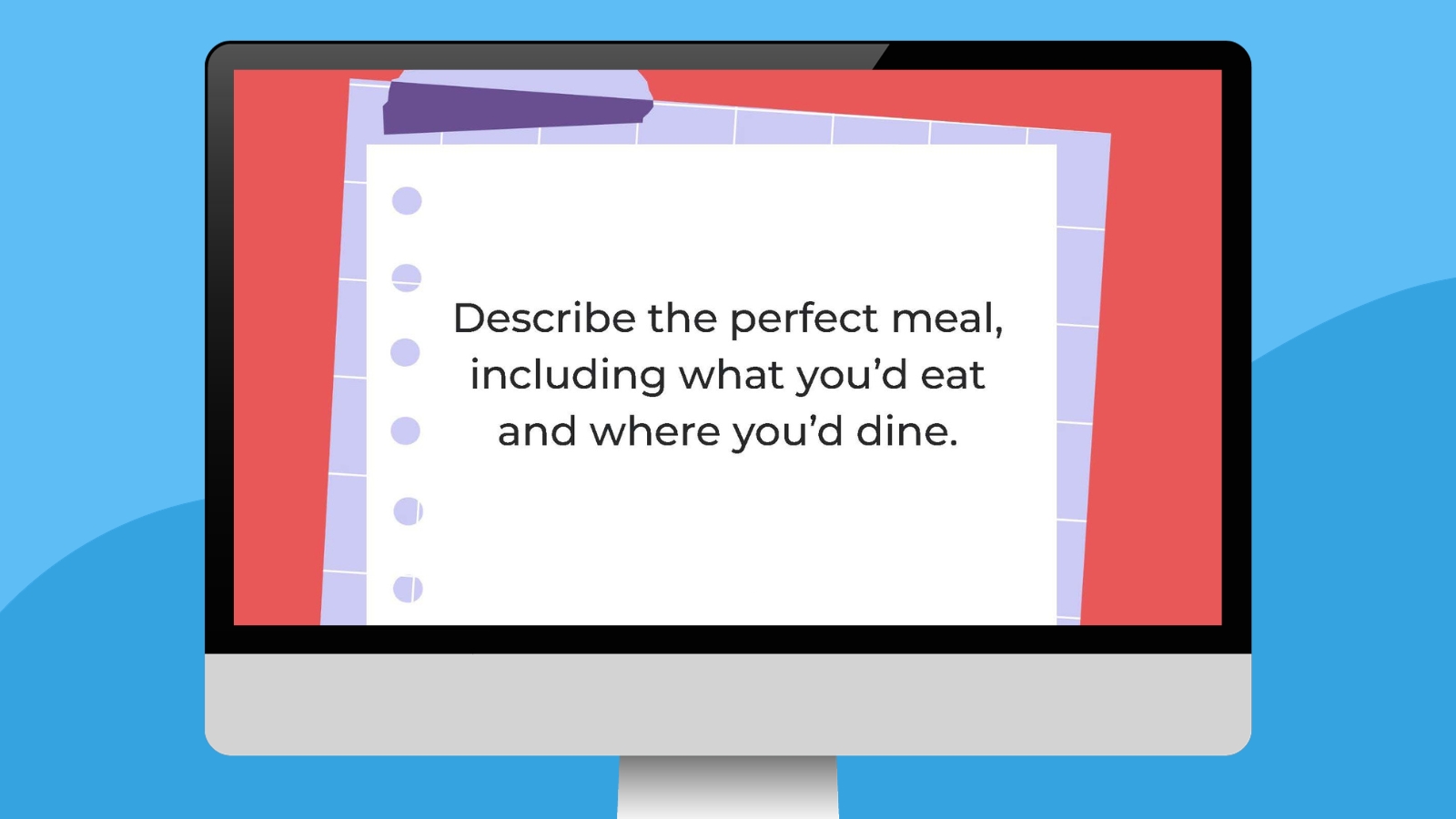
Fourth grade is a time for students to continue to hone their writing chops as they put to use the skills they’ve learned and gain confidence in their abilities. We’ve collected this list of fourth grade writing prompts—including opinion, persuasive, informational, and narrative—to spur your students’ imaginations and get them writing!
You can get 50 of these fourth grade writing prompts in a free PowerPoint slideshow bundle! They make it easy to share these writing ideas with your students. Grab your free PowerPoint bundle by submitting your email here .
- Persuasive and Opinion Writing Prompts
- Descriptive and Expository Writing Prompts
- Narrative and Personal Writing Prompts
- Creative Writing Prompts
- Current Events Writing Prompts
Persuasive and Opinion 4th Grade Writing Prompts
Would you rather be good at sports or good in school? Why?
Would you rather have lots of money or lots of friends? Why?
What is your favorite subject in school? Why?
Are fourth graders ready to stay home alone? Why or why not?
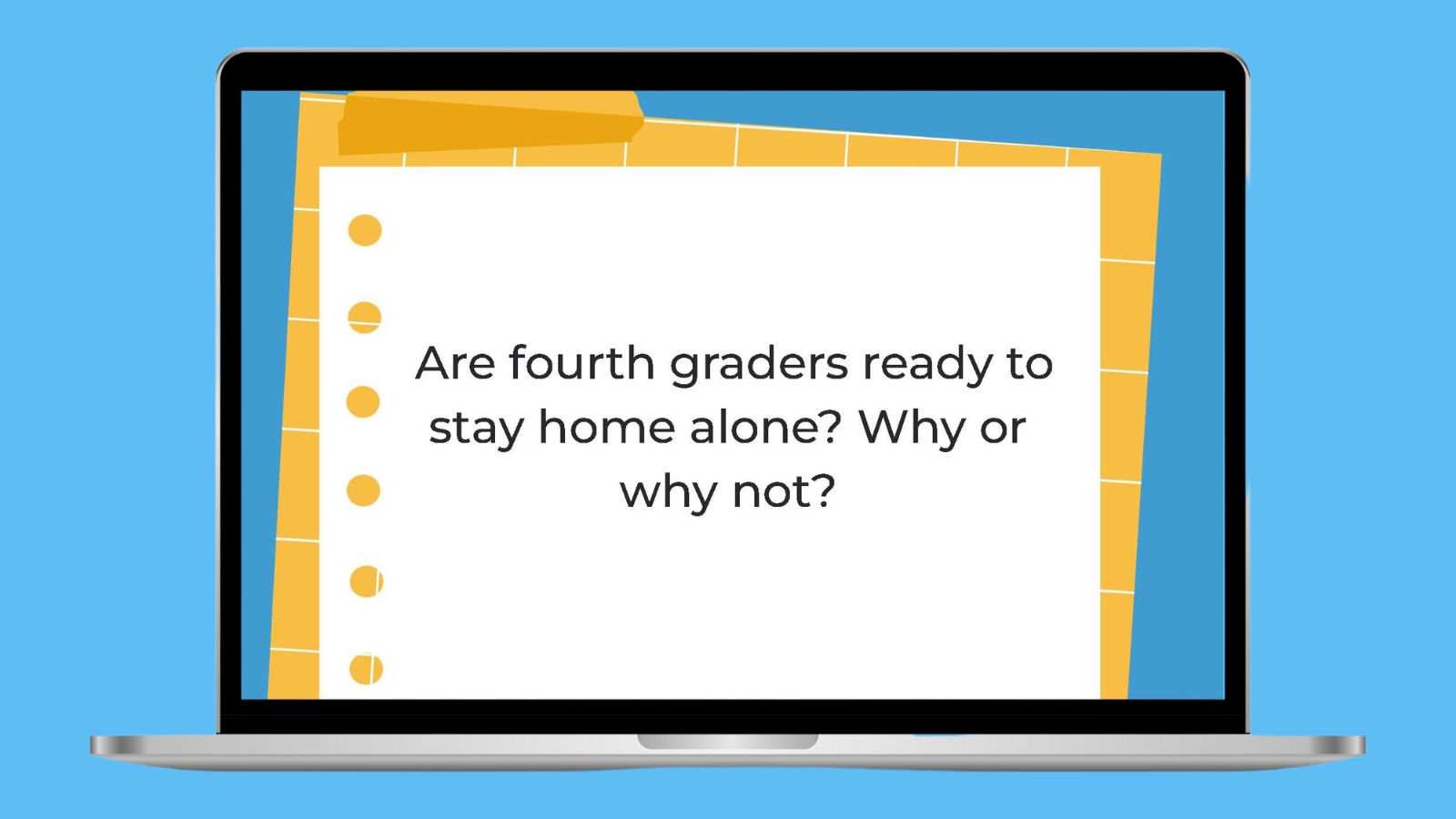
Name two characters from different books that you think might be good friends. Why?
Which is more important for success, skill or luck?
Should kids be paid an allowance to do chores around the house? Why or why not?
Why are classroom rules important?
If you had a time machine, what era of history would you visit?
Why is math important?
Why is science important?
Should fourth graders have cell phones? Why or why not?
If you could open a store, what type of store would it be and why?
Which would you rather read: a scary story that gives you goosebumps or a funny story that cracks you up? Why?
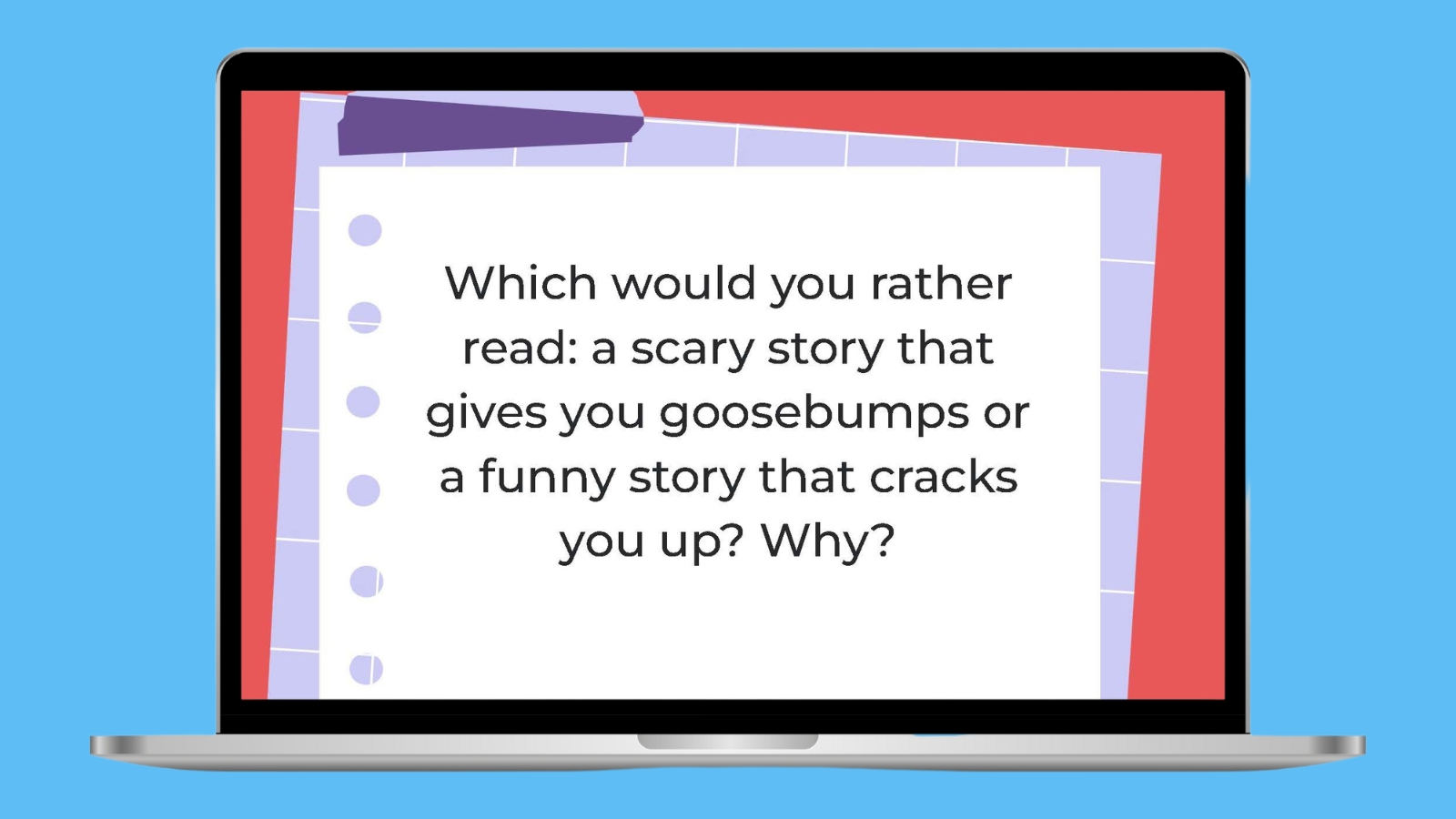
What is the hardest thing about being a fourth grader?
If I were the ruler of the world, the first law I would pass would be … because …
If you found a backpack filled with dollar bills, what would you do?
Is it ever OK to tell secrets? Why or why not?
What animal makes the best pet? Why?
Is it better to spend an hour a day reading or an hour a day exercising? Why?
Descriptive and Expository 4th Grade Writing Prompts
If you had a YouTube channel, what would you talk about?
What’s the best book you’ve read recently? What was it all about?
If you won a million dollars, how would you spend the money?

Describe what you think of as perfect weather.
Describe how to build a birdhouse step by step.
Write five rules for staying organized.
What is the worst book you ever read?
Describe the physical appearance of someone in your family in detail.
Imagine you are in a hot-air balloon above your house. Describe everything you can see.
Describe how to play your favorite board game.
There’s an old saying: “The squeaky wheel gets the grease.” What do you think this saying means?
Describe your perfect day.

One of your little cousins is very nervous about starting kindergarten. What would you tell them to make them feel better?
Imagine you are an adult and describe your dream job.
Explain your morning routine in detail, from waking up to arriving at school.
Describe the perfect meal, including what you’d eat and where you’d dine.
Share what you do on a typical non-school day.
Explain the right way to do one of your household chores, like making your bed or cleaning your room.
Describe your favorite room at home in detail.
How do you prepare for a big test? Describe the ways you study or practice.
Narrative and Personal 4th Grade Writing Prompts
Share one of the stories your family has told you about when you were a baby.
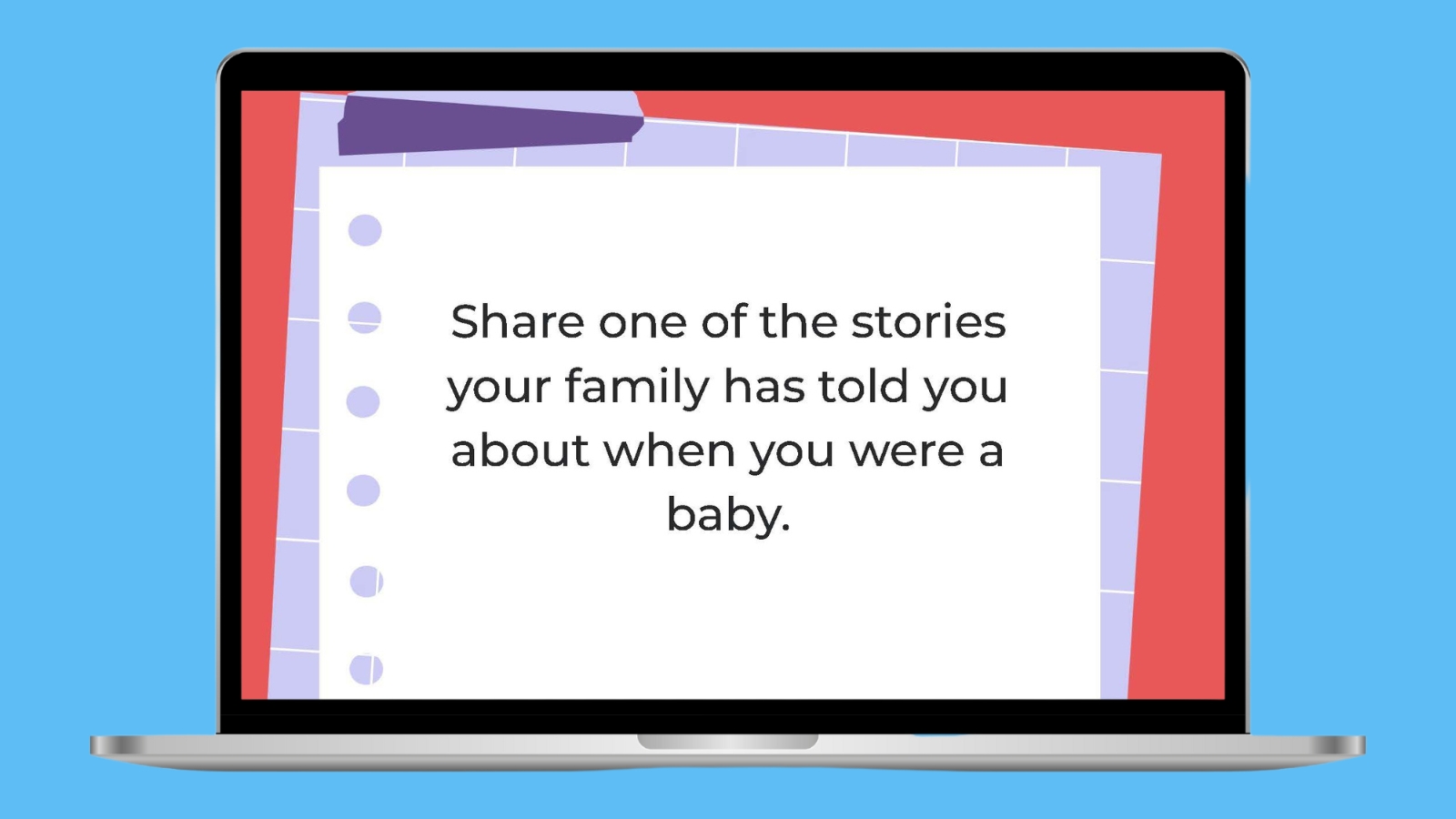
What is the funniest thing that has ever happened to you?
Write about an adult you look up to.
What’s the nicest thing anybody has ever done for you?
If you could change one thing about yourself, what would it be?
Write about a time you felt like quitting but didn’t. How did you keep yourself going?
Do you like nonfiction books or fiction books better? Why?
What makes your family unique?
What would you say is your greatest strength? Greatest weakness?
Are you a patient person? Why or why not?
What is something you’ve never done that you would like to try?
What is the weirdest thing that has ever happened to you?
Write about a time you tried something new and how you felt before, during, and after.
What is your earliest memory?

What’s your favorite holiday? What makes it so special?
Write about a time when you felt proud of yourself.
Tell the story of your favorite field trip of all time.
If you could relive any day in your life, what would it be? Would you want it to be the same or different?
What holiday is important to your family? Describe how you celebrate it together.
What’s the best gift you’ve ever gotten? How did it make you feel?
Creative 4th Grade Writing Prompts
If you met an alien, what three questions would you ask them?
Pretend you drank a magic potion that made you as tiny as an ant. Where would you go and what would you do?
Pretend you ate a magic pill that made you as tall as a redwood tree. Where would you go and what would you do?
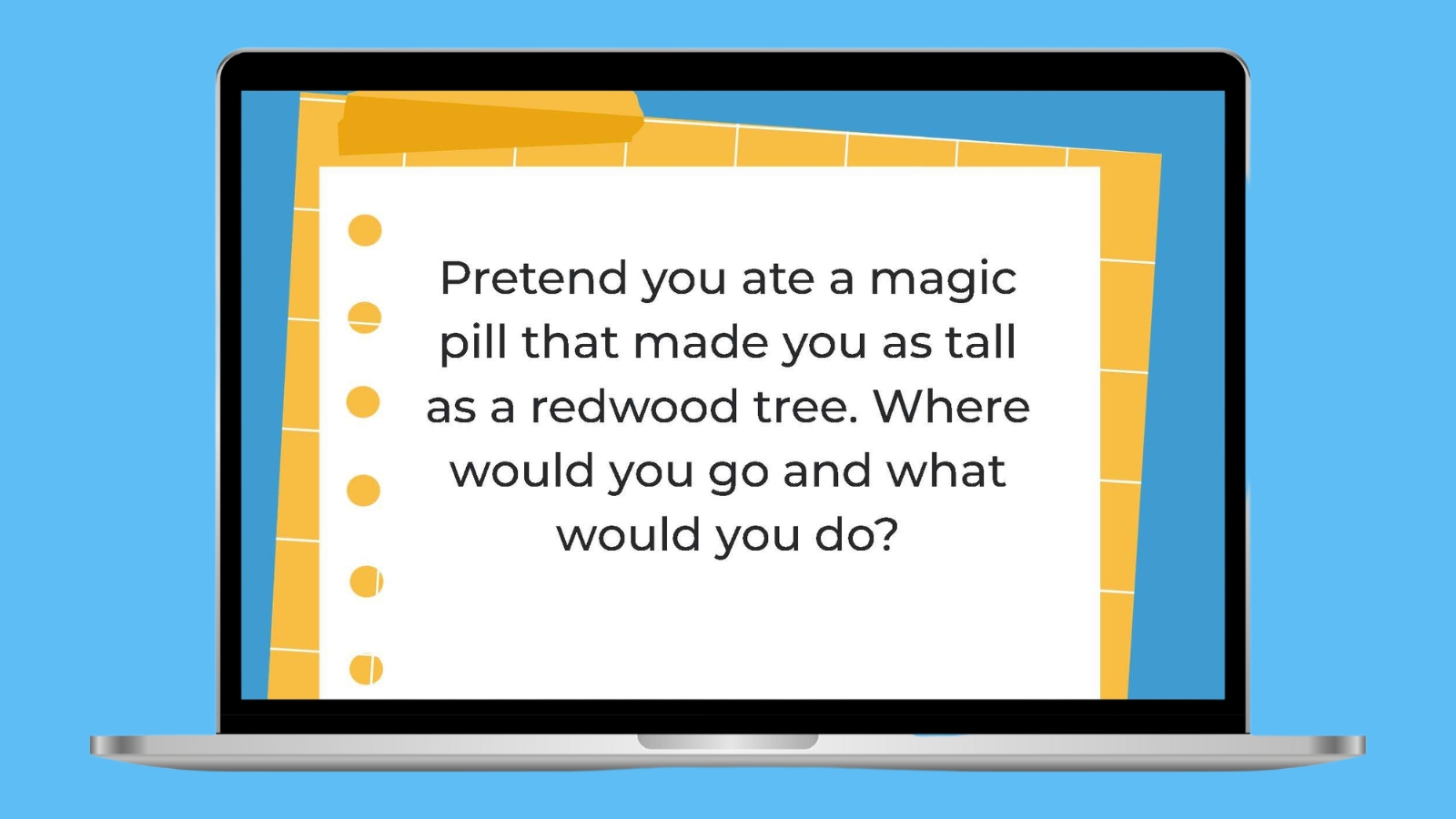
Write a story that includes these five words: keys, spaghetti, uncle, jellyfish, spaceship.
What would the world be like if dinosaurs still existed?
If you could invent something new the world really needs, what would it be? How would it work?
Retell a classic story, making the villain the hero instead.

Imagine that one day you woke up and found everyone in the world could no longer talk. What would happen next?
Write a new chapter of your favorite book, with yourself as a new character.
Imagine you woke up one morning with a superpower, like invisibility or the ability to fly. Describe your experiences learning how to use that power.
Use these words to start a story: “When I opened the box that came in the mail, I never expected to find …”
Describe a world where it rains fruit juice and snows M&Ms.
Come up with the most ridiculous excuse possible for why you are unable to turn in your homework today.
Describe a world where all the adults are robots, but kids are still human kids.
Imagine a conversation between yourself and a talking animal.
Describe the kind of creature you’d create if you were a mad scientist. Would it be scary and mean? Nice and friendly?
Invent a new kind of candy. Give it a name, and write a commercial jingle for it.
Write about a day where kids are in charge instead of grown-ups.
Imagine you’re lost in a haunted wood, and tell the story of your escape.
Tell a story that ends with these words: “… and that’s how we all learned to fly.”
Describe a night in the life of the tooth fairy.

Current Events 4th Grade Writing Prompts
If you made a time capsule for this year, what would you put in it?
Describe something that you saw in the news recently and how it made you feel.
Tell about an event that happened recently at your school or in your town.
What do you think is one of the world’s biggest problems right now, and how would you solve it?
Read a news story about something happening in another country and summarize it.
Write a news article about something important that happened to you this week.
Create a poem about something in the local news right now.
Write a letter to the editor about a current issue, explaining your opinion.
Find a “good news” story, and share why it makes you happy.
What living famous person do you most admire and why?
What do you think kids today can do about climate change and global warming?
Learn about an endangered animal, and describe what we can do to help it.
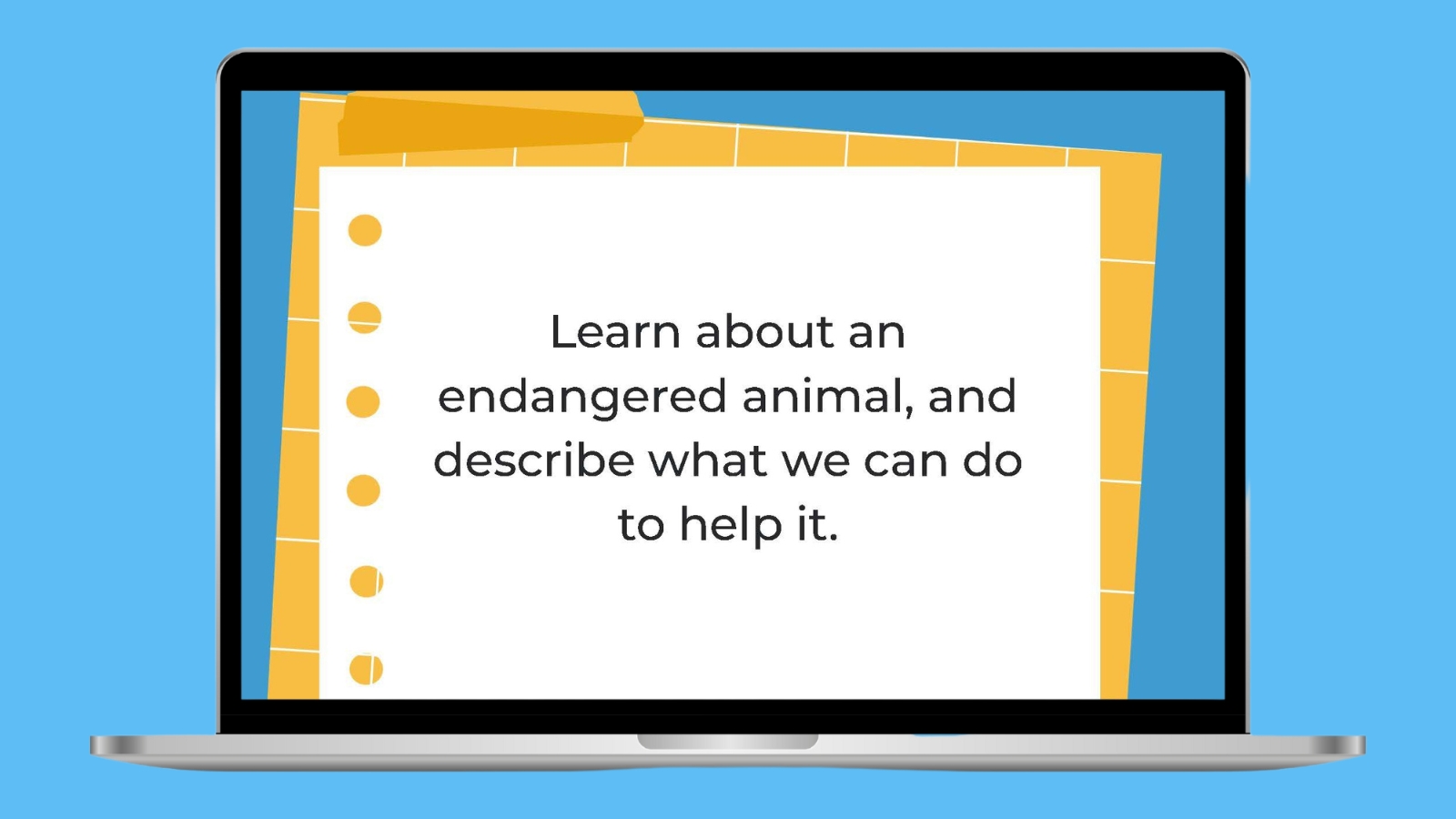
What does the word “racism” mean to you?
What is one thing you would do to make your school or town a better place?
Choose an upcoming sports event, and explain who you think will win.
Describe a current fashion trend or something that’s very popular in your school right now, and how you feel about it.
What can we do to help people with different opinions get along with one another better?
Interview a grown-up you know, and write a news article about them.
What do you think is the best new song right now? The worst? Why?
Describe an event that’s happening in the world right now that you don’t understand. What questions would you ask a grown-up about it?
How do you use writing prompts with your students? Come share your ideas and ask for advice in the We Are Teachers HELPLINE group on Facebook .
Also check out 57 awesome 4th grade books you’ll want to share with students ..
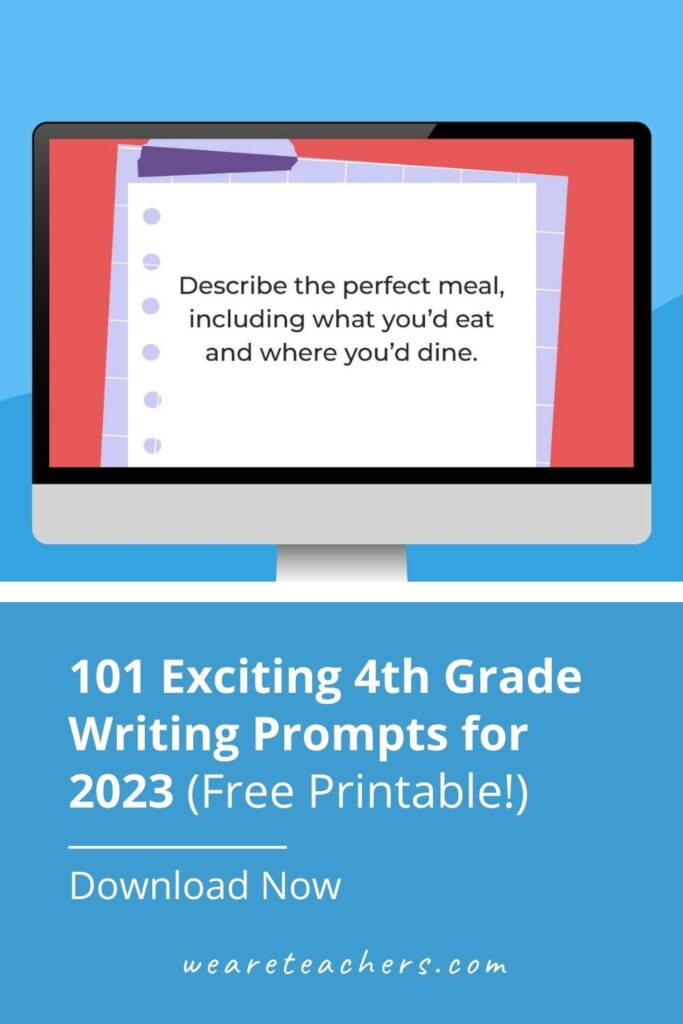
You Might Also Like
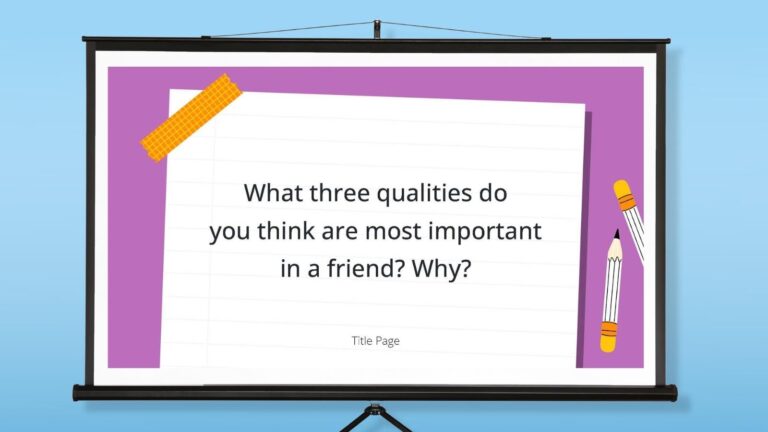
75 Creative Fifth Grade Writing Prompts (Free Slides!)
Get them excited to write every day! Continue Reading
Copyright © 2023. All rights reserved. 5335 Gate Parkway, Jacksonville, FL 32256
Squarehead Teachers
Free teacher stuff to get your elementary classroom all squared away.

60 Narrative Writing Prompts for Kids

2. Write to tell of a day when you were the teacher. What did you do?
3. Write a story about trading places with your favorite TV, movie, or rock star.
4. One day a spaceship lands on the playground of your school . . .
5. Your shoe must have a story to tell. Tell it.
6. Your class grew plants as a science project. One day you looked at your plant and saw
something really strange had grown there.
7. Write a story about what it would be like if you woke up one morning with wings.
8. On your birthday, a strange-looking lady came to you door and handed you a wrapped present. You rattled it. It made a noise. Write a story about this present.
9. Your teacher one day announced that your class was going on a wonderful field trip. Write a story about this field trip. In your story, you can have your class go anywhere you wish.
10. One day, as you were petting and talking to your friend’s dog, it answered back! Write a story about this.
11. Write a story about yourself as a hero. What did you do to become a hero? Tell your story.
12. As you walked down the hallway at school, you heard some strange music coming from the custodian’s closet. What was it? Write a story about it.
13. Tell a story about children who live in a world where there is no such thing as television, computers, or electronic games.
14. A distant relative bequeathed you a strange ring. As you put this ring on, you discover that it has strange powers. What does it look like? What does it do? Tell a story about this ring.
15. Tell a story about your ideal place to live. What would it be like to live here?
16. The teacher comes into the room and places a bag on her desk then leaves. The bag moves and wriggles. Write a story about what is in the paper bag.
17. Everyone has a day in his or her life that was extra special or dreams about what he or she would do on a special day. Write a story about a special day you have had or imagine you might have.
18. Every day you pass a door. It’s always closed and locked. One day, as you pass, you notice that the door is open. You step inside. Write a story about what was on the other side of that door.
19. Tell a story about what happened when you traveled on a wagon pulled by horses.
20. Tell a story about a day in which everything went wrong.
21. Imagine you could travel to the future and live there. Think of what you think the future would be like. How different would it be from today? Now, write a story about living in the future.
22. Imagine you could go to any place you wanted for as long as you wanted any time you wanted. What place would you visit? Think about what you would do there. Write a story about a visit to a really neat place.
23. Pretend that you lived in colonial times. Think about what your life would be like, how it would be different living more than 200 years ago. Now, write a story about a young person (or yourself) living in George Washington’s day.
24. Novels are fun to read because the action keeps you interested, and the characters almost become your friends. Think of a book you really liked. Imagine that you were a new character in this book {choose a book your class has read}. Write a story about what happened.
25. Imagine you woke up one morning and found that you had switched places with a dog or a cat. Think what it would be like. What would you do? Write a story of your day as a dog or a cat.
26. What if you had a personal genie who would grant your every wish? What would your life be like? Think of some of the details. Write a story about having a personal genie.
27. Imagine you had a car that would take you anywhere you wanted to go for one day. Think of where you went in that car and what you did. Write a story about that day.
28. Everyone has a favorite season of the year. What is your favorite season? What do you like to do? Write a story about your favorite season.
29. Imagine one morning there’s a knock at your front door. You open the door, and to your great surprise, you find an alien standing there. What do you do? What does it look like? Write
a story about your encounter with this alien.
30. On your way to school one morning you see a huge truck speeding down the road. Suddenly, the back door of the truck opens and a large, mysterious box falls off the back of the truck. It sits there in the road. What is in the box? What do you do? Write a story about this mysterious box.
31. One spring day a skunk wanders into your classroom. What are the results? Write a story about the skunk that visited school.
32. Imagine you had a time machine that you could take only to the past. Where would you choose to go? Think of what you would do there, what it would the like. Write a story of your adventure in the past.
33. One day you are sitting under a large tree. An acorn hits you on the head, and you look up. There, on the branch above you sits a squirrel, laughing at you. The squirrel then looks you square in the eye, begins to talk to you, and asks you to return its acorn. What would you do?
What would happen if you encountered a talking squirrel? Write a story about the experience.
34. Imagine a world where there was no money. What would people do? What would life be like? Write a story about living in a world without any money.
35. There are times when we all wish, even for just a moment, that we could be someone else for a day. Who would you choose to be for that day? What would you do? Think of some details of your day. Now write a story about what your day was like as that person.
36. In a recent disaster, there were some kids who did some heroic things. Think what constitutes (makes) a hero. Imagine yourself as one. Now write a story in which you were a hero/heroine in a tough situation.
37. A little old lady gave you and a friend some magical glitter and told you to sprinkle it on your hair and something special would happen. What happened when you tried it? Write a story about this mysterious magical glitter.
38. One day you and your friends walked up to an old, seemingly abandoned house. You couldn’t see inside due to the dust and cobwebs on the windows. You decide to see if the door is locked. You try the knob, and it turns. The door creeks open as if it has not opened in years . . . What happens next? What do you find? What do you and your friend do? Write a story about entering that old, seemingly abandoned house.
39. Love comes in all forms. We can love our parents, a boyfriend or girlfriend, a favorite pet, a brother or sister, a place, even a thing. Thing about someone or something you love. Write a story about that person or thing that involves your feelings.
40. Imagine that your sense of smell was more highly developed than everyone else’s. What experiences might you have? How might your life change? What would you be able to smell? Write a story about a person with a very highly developed sense of smell.
41. Imagine yourself temporarily lost in a foreign country where you do not know the language. How do you manage to communicate? What might happen to you? Write a story about a day you might have spent lost in a foreign country without knowing the language.
42. Imagine a city project to have every school student do some hours of community service as a part of the required curriculum. What would you choose to do? What do you think it would be like? What people might you meet? What would you be doing to help? Write a story about your day of community service.
43. Sometimes family members or friends embarrass you when other people are around. Think of some times this has happened to you. Think of what could happen. Write a story about some embarrassing incident you might have had and how you coped with it.
44. Now and then you, without meaning to do so, break something that belongs to someone else. Think about what might be broken. Think about what might happen as a result. Now, write a story about accidentally breaking something that belonged to someone else and the story of what happened as a result.
45. One day your teacher must go home. Your teacher leaves, telling you that someone else will teach the class for the rest of the time. Who do you think will replace the teacher? What happens as a result? Write a story about a time your teacher had to go home, and someone
else took over the class.
46. Imagine you opened your own restaurant. Tell the name of your restaurant. Explain what the restaurant looks like, who works there, and what you serve.
47. Describe your favorite character from a book, a movie, or television.
48. Write a story titled, “My Journey on a Pirate Ship.” You and your friends can star in the story.
49. If you could have any animal for a pet, what would it be? Describe the pet and how you would take care of it.
50. Do you have any brothers or sisters? If you do, tell what they’re like. If not, tell whether or not you would like to have a brother or sister.
51. If you could have lunch with any famous person who would it be? What would you talk about with this person?
52. How old were you four years ago? Describe some things you can do now that you could not do then.
53. If you could be on any game show, what would it be? Describe what happens when you’re on the show.
54. Describe several ways a person your age can earn money.
55. If you could spend an afternoon with one member of your extended family, who would it be? Tell why you chose this person and tell what you do together.
56. Which superpower would you most like to have– invisibility, super strength, or the ability to fly? Describe what kids of things you would do with your powers.
57. Think of a time when you’ve won something. Tell what you won and how you won it.
58. Invent a new kind of sandwich. Describe what is on it and how you would make it.
59. Describe one thing you’re really good at.
60. Imagine you were twenty feet tall. Describe what life would be like. How would it be different from your life now?
Share this:
- Click to share on Pinterest (Opens in new window)
- Click to email a link to a friend (Opens in new window)
- Click to share on Facebook (Opens in new window)
- Click to share on Twitter (Opens in new window)
- Click to share on Tumblr (Opens in new window)
- Click to print (Opens in new window)
- Click to share on LinkedIn (Opens in new window)
- Click to share on Reddit (Opens in new window)
- Click to share on Pocket (Opens in new window)
103 thoughts on “ 60 Narrative Writing Prompts for Kids ”
Fantastic! I love the variety of topics. 🙂
it is the best narrative ideas!:)
Thank you! Happy to share!
hi i like this
Why nothing about gi joe
Yeah, there pretty good!
Good job to Squarehead Teachers for making this.
It’s meh not a lot of depth to the prompts kids have trouble carrying it on to a story without rambling on and on
Ok that’s a little harsh ;-;
you’re nice
Please leave a comment (No sign-in required). Thanks! Cancel reply
This site uses Akismet to reduce spam. Learn how your comment data is processed .
- Already have a WordPress.com account? Log in now.
- Subscribe Subscribed
- Copy shortlink
- Report this content
- View post in Reader
- Manage subscriptions
- Collapse this bar
Search the blog
Input your search keywords and press Enter.
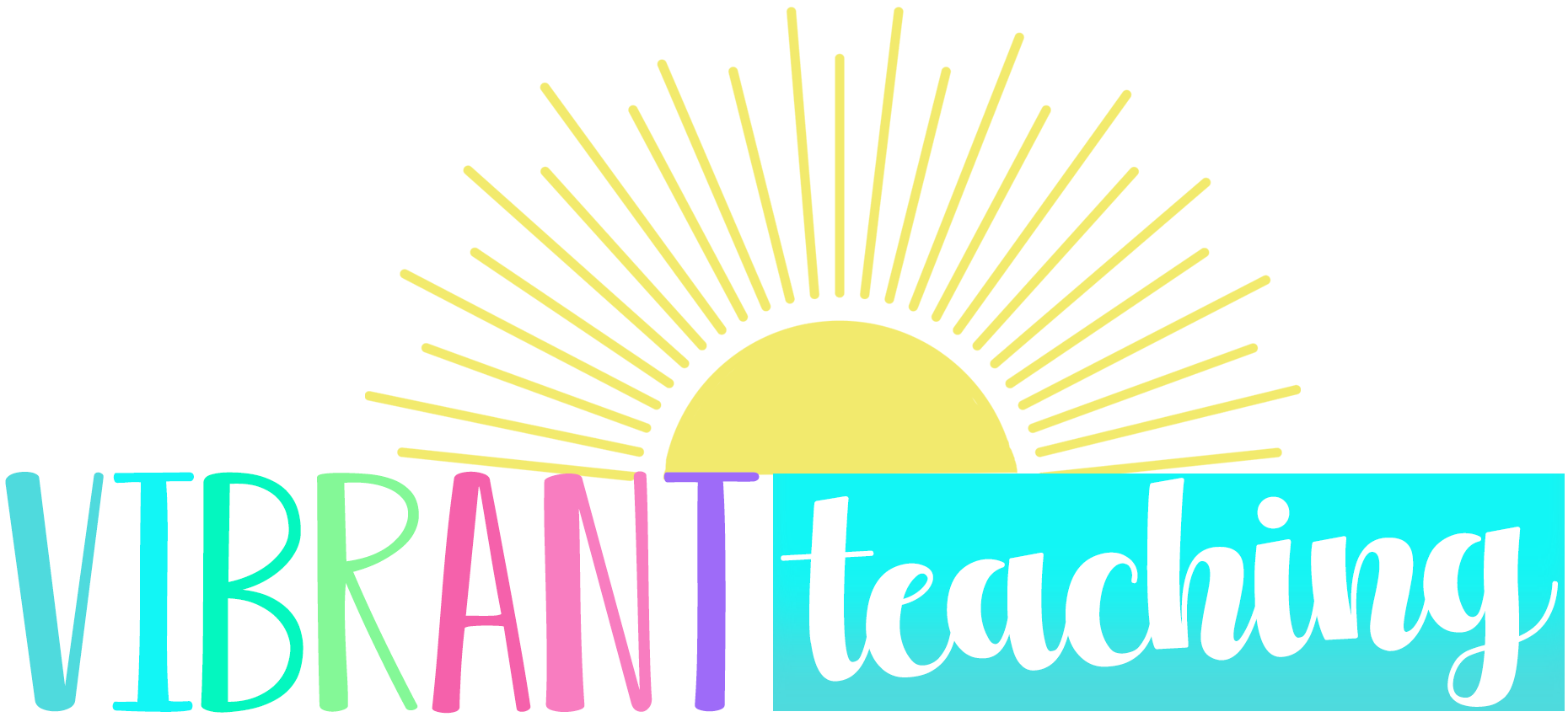
Vibrant Teaching
Teaching Resources Creator and Blogger
20 Prompts for Narrative Writing That Spark Creativity

Using prompts for narrative writing motivates kids and gets them excited to write. Read on to learn more about narrative writing, mentor texts, ideas, and assessments. Plus you will find 20 fun prompts for narrative and personal narrative writing. These will be sure to spark student’s creativity and imagination!
What’s Narrative Writing?
Narrative writing tells a story using a beginning, middle, and end. It includes elements such as characters, setting, problem, and solution. The author’s purpose is usually to entertain or teach a lesson. Narrative writing can be fact or fiction but the process is the same. When it’s a real story from the author’s life, it is considered a personal narrative.
Examples for Narrative Writing
There are so many wonderful examples of narrative writing. Some are even written as personal narratives. Below you will find a list of mentor texts for elementary school. It’s helpful to immerse students in the genre before and during a narrative writing unit. These books model different strategies that kids can try in their writing.
Narrative Writing Mentor Texts:
- Owl Moon by Jane Yolen
- Come on, Rain! by Karen Hesse
- Those Shoes by Maribeth Boelts
- Fireflies! by Julie Brinckloe
- Knuffle Bunny by Mo Willems
- Jabari Jumps by Gaia Cornwall
- Enemy Pie by Derek Munson
- Blackout by John Rocco
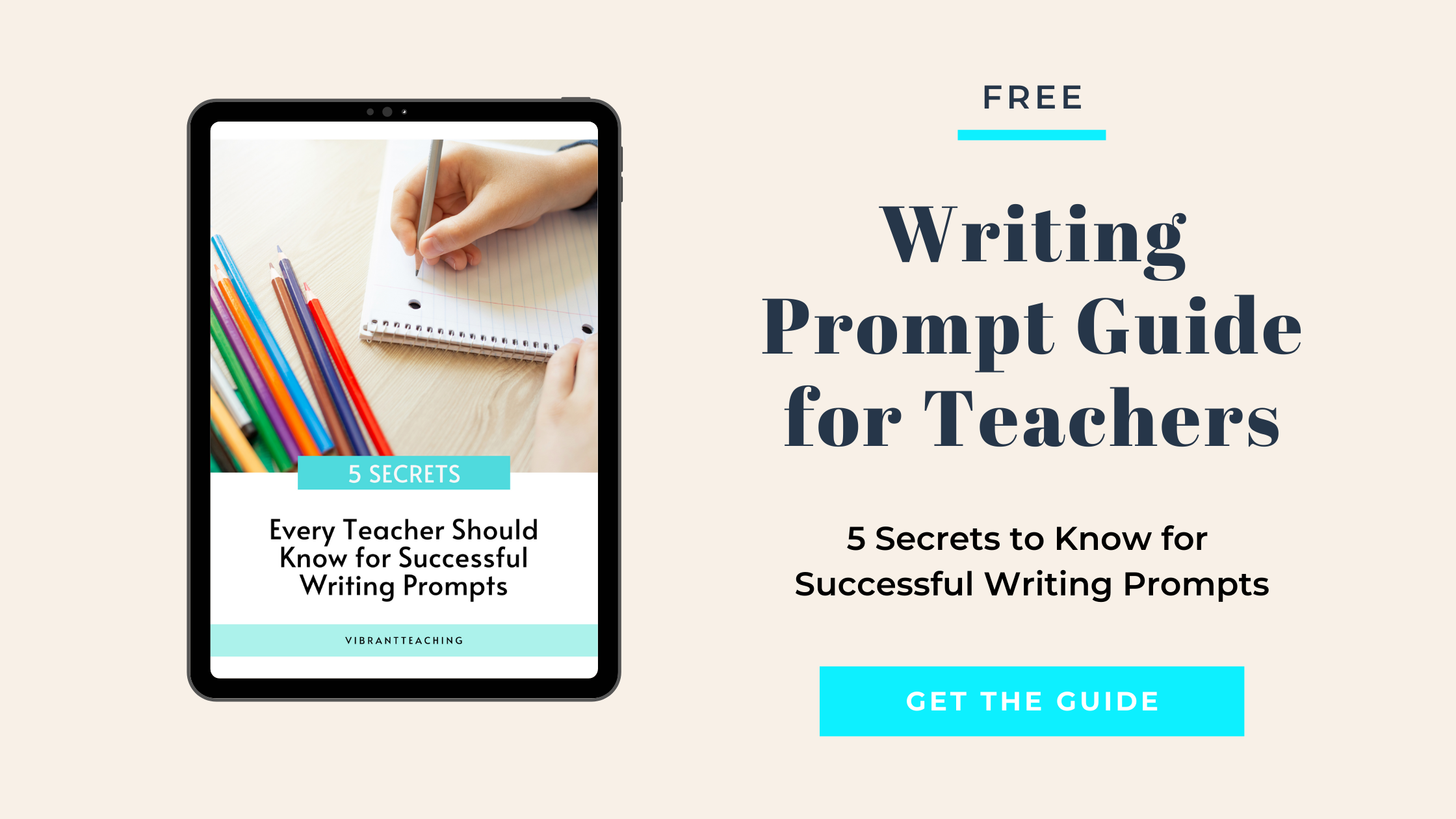
Narrative Writing Teaching
There are many features to include in narrative writing, but it depends on the grade level being taught. For the lower grades, it’s important to start with the concept of beginning, middle, and end written in sequential order. Then you can expand to the introduction, body, and conclusion using details. Other important elements are character, setting, problem, and solution. As the student’s abilities increase the number of sentences will grow and expand to paragraphs.
For the older grades, you can introduce plot structure. It follows the beginning, middle, and end format but on a higher level. This story arc includes exposition, rising action, climax, falling action, and resolution. Use the diagram below to see how these features overlap.
Plot Structure
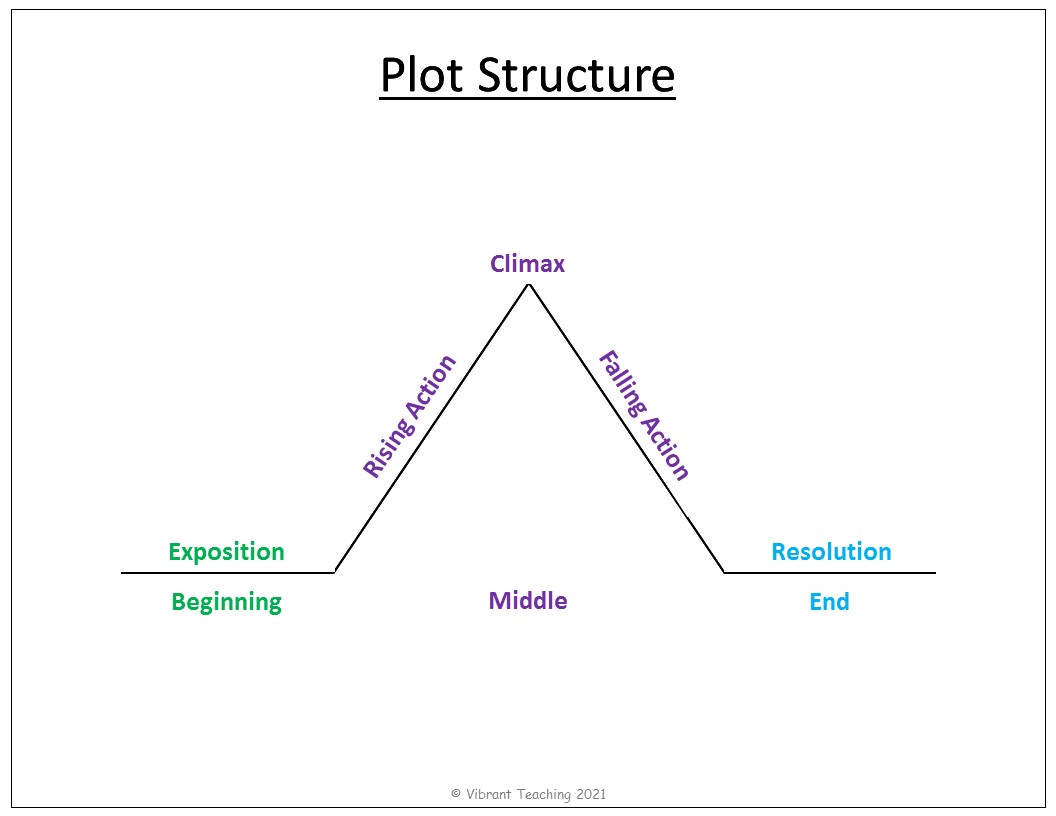
Topics for Narrative Writing
The possibilities are endless when it comes to narrative writing ideas. Kids can create a fiction piece or write about an experience in their life. Check out some writing prompt ideas below for narrative and personal narrative writing. You might also like this blog post about opinion writing prompts: 20 Prompts for Opinion Writing That Motivate Kids
Writing Prompts for Narratives
- I was taking my friend’s picture in front of the volcano when all of a sudden . . .
- What if you were given 3 wishes but couldn’t use them on yourself. Tell a story about what you would wish for and why.
- Write a story called, “The Luckiest Day of My Life.”
- Imagine you went to the zoo and could take home any animal for the day. Tell a story about your time together.
- Write a silly story that uses these words: airplane, grapes, elephant, and book.
- You have just been shrunk down to the size of an ant. Write a story including the good and bad things about being so small.
- Think about your favorite character from a book. Tell a story about getting to meet them for the first time.
- What would happen if you lived during a time when there was no electricity? Write a story about your school day.
- Finish this story: The pirates set sail on their ship in search of . . .
- Suppose you were teacher for a day. Write a story about the changes you would make.
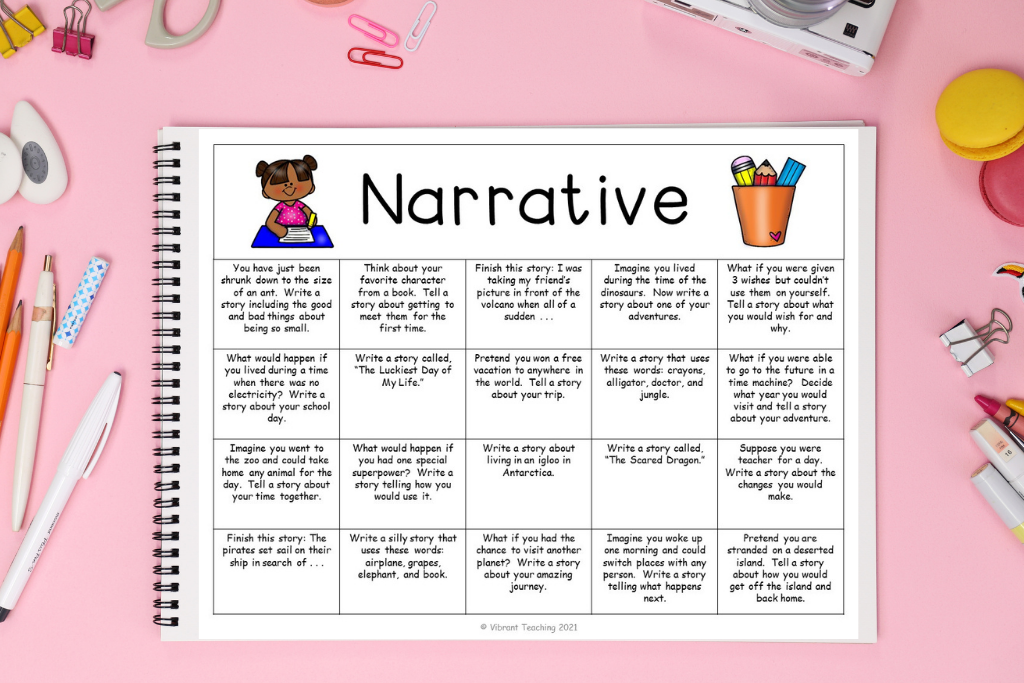
Writing Prompts for Personal Narratives
- Have you ever been so proud of yourself for learning something new? Write a story about a time this happened.
- Write a story about a time you felt your heart race. What happened and how were you feeling at the end?
- What was your most memorable vacation? Tell a story from part of that trip and why it stands out in your mind.
- Have you ever done something you knew would get you in big trouble? Write a story about a time this happened and how you felt about it.
- Write a story about the strangest thing that has ever happened to you. Why was it so unusual?
- What was your most memorable moment from this year? Write a story telling why it’s so special.
- Tell a story about a time when you were so excited and couldn’t wait for an event to happen.
- Write a small moment story about a time you had with your favorite person.
- Write about a time that you lost something important. Tell whether or not you found it.
- Think about the worst day you ever had. What made it so terrible and did it get better by the end?
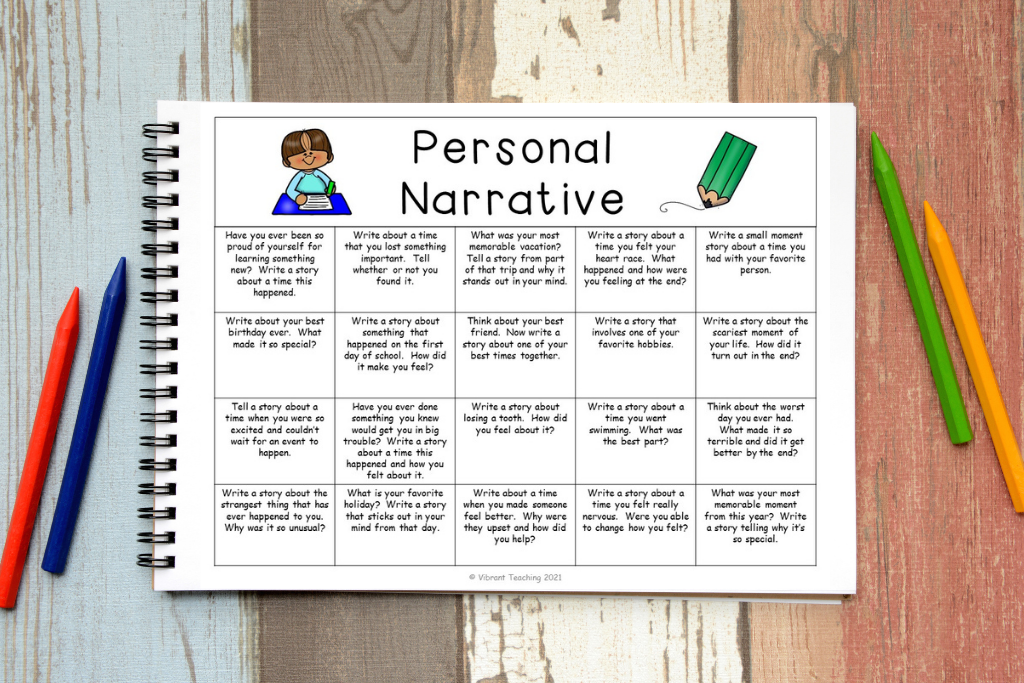
Rubrics for Narrative Writing
I often hear from teachers that one of the most difficult parts of teaching writing is how to assess it. Assessments should be accurate and helpful for both the student and teacher. When it comes to narrative writing, there are many different approaches. Some teachers prefer to do a more informal assessment for daily writing pieces and then a formal assessment for the final copy. Informal assessments can be completed with written comments or student-teacher conferences.
It would be very difficult to use a rubric for every narrative writing a student completes in their notebook. Instead, most teachers prefer to choose one to three writing pieces to assess with a rubric. These assessments are ideal for benchmarks, progress reports, and report cards. Below you will find three types of narrative writing rubrics. Check out this blog post to learn more about student-friendly, teacher-friendly, and time-saving rubrics: 3 Types of Writing Rubrics for Effective Assessments
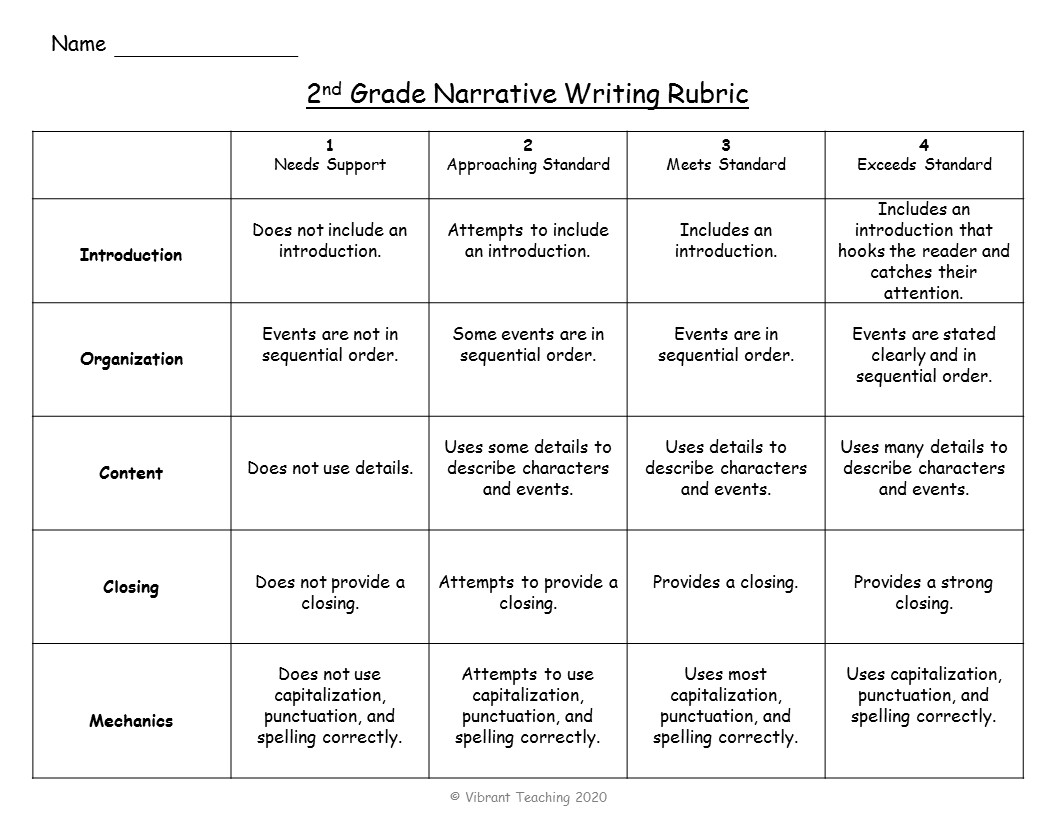
Narrative writing enables kids to be creative and use their imagination. They can write a fiction story or about a real event from their life. Writing prompts are a helpful tool to get kids engaged and ready to get started. Did you grab your Free Writing Prompt Guide yet? I love using prompts for morning work, writing time, centers, or as a homework assignment. The possibilities are endless! Be sure to try these prompts for narrative writing with your students!
Genre Based Prompts
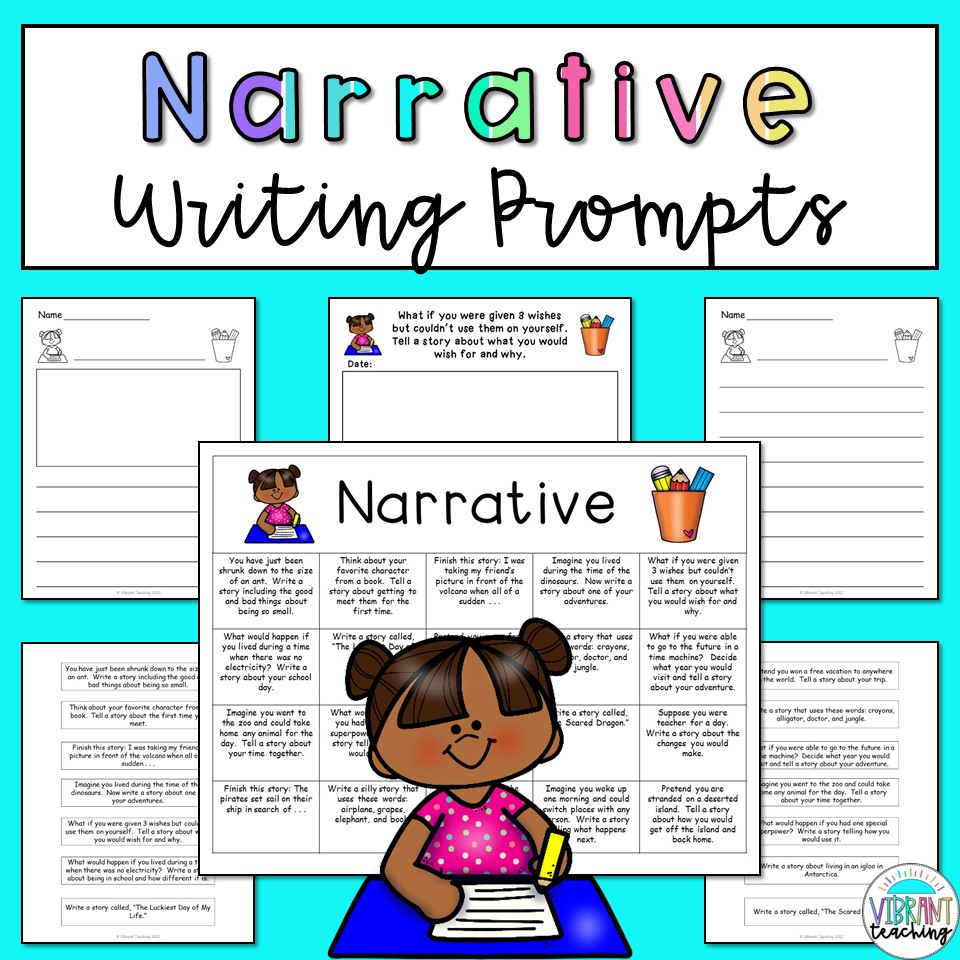
Related Articles:
- 20 Prompts for Opinion Writing That Motivate Kids
- What is Narrative Writing
- A Complete Guide to Narrative Writing
- Personal Narrative Writing for Elementary School
- Narrative Writing: How to Teach a Story Arc That’s as Exciting as a Roller Coaster
Angela Sutton
Related posts.

How to Find Perimeter in 3 Easy Ways
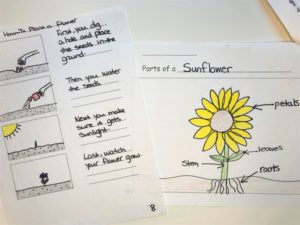
Informational Writing: Teaching All About Books
3 Types of Writing Rubrics for Effective Assessments
No comments, leave a reply cancel reply.
I accept the Privacy Policy
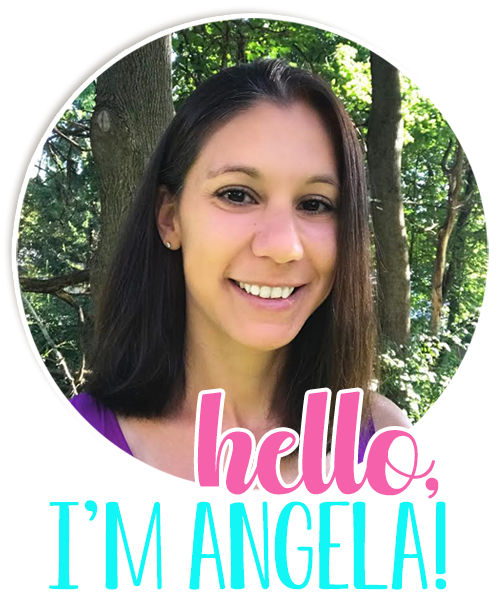
I specialize in helping elementary teachers with writing resources, tips, and ideas. My goal is to save teachers time and energy so they can be vibrant inside and outside of the classroom! Read More
SEARCH THE BLOG
Subscribe to our mailing list.
Get the news right in your inbox!
Health and Wellness
- Skip to primary navigation
- Skip to main content
- Skip to primary sidebar
- Skip to footer

Thrifty in Third Grade
By Cassie Smith - Engaging Elementary Resources
100 Exciting Narrative Writing Prompts for 3rd, 4th, and 5th Grade
Are you teaching narrative writing to your students and in need of some unique and creative writing prompts? An exciting writing prompt can be all your students need to finally feel motivated to write!
If your students are bored with regular “write a story about a magical place” narrative writing prompts, then they are going to LOVE these!
These writing prompts are unique and will really get your students’ imaginations churning!
So get the creative juices flowing with this list of 100 creative and inspiring narrative writing prompts!
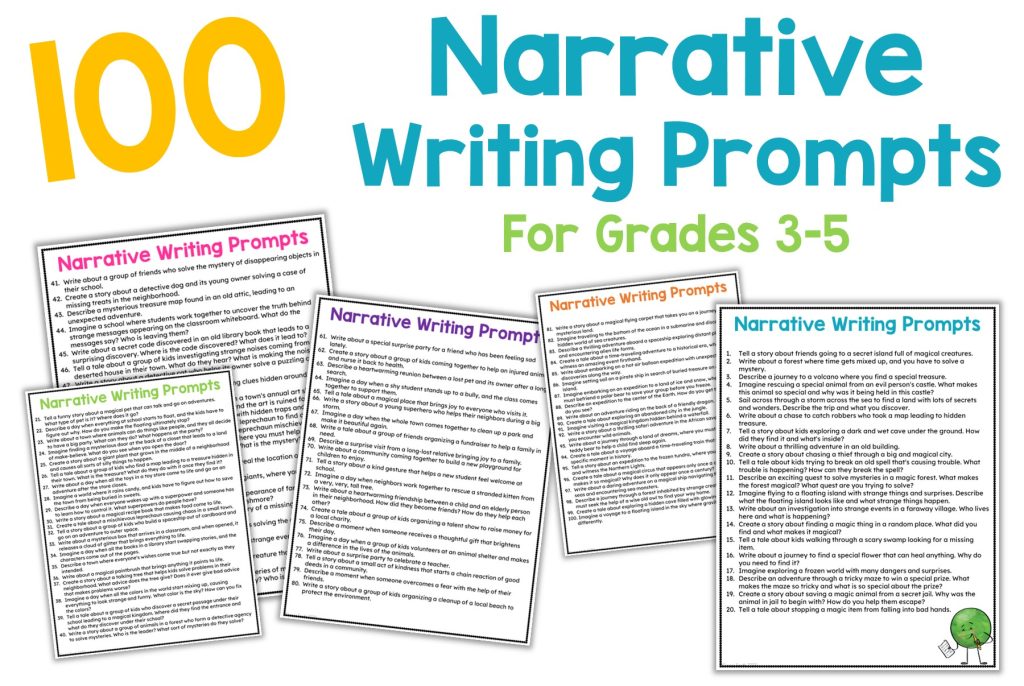
Be sure to sign up below to get the printable copy of this list of 100 narrative writing prompts!
I’ve bolded some of my FAVORITE narrative writing prompts in each of the categories below.
Adventures Await Narrative Writing Prompts
- Tell a story about friends going to a secret island full of magical creatures.
- Write about a forest where time gets mixed up, and you have to solve a mystery.
- Describe a journey to a volcano where you find a special treasure.
- Imagine rescuing a special animal from an evil person’s castle. What makes this animal so special and why was it being held in this castle?
- Sail across through a storm across the sea to find a land with lots of secrets and wonders. Describe the trip and what you discover.
- Write about a chase to catch robbers who took a map leading to hidden treasure.
- Tell a story about kids exploring a dark and wet cave under the ground. How did they find it and what’s inside?
- Write about a thrilling adventure in an old building.
- Create a story about chasing a thief through a big and magical city. What did the thief steal? Why
- Tell a tale about kids trying to break an old spell that’s causing trouble. What trouble is happening? How can they break the spell?
- Describe an exciting quest to solve mysteries in a magic forest. What makes the forest magical? What quest are you trying to solve?
- Imagine flying to a floating island with strange things and surprises. Describe what the floating island looks like and what strange things happen.
- Write about an investigation into strange events in a faraway village. Who lives here and what is happening?
- Create a story about finding a magic thing in a random place. What did you find and what makes it magical?
- Tell a tale about kids walking through a scary swamp looking for a missing item.
- Write about a journey to find a special flower that can heal anything. Why do you need to find it?
- Imagine exploring a frozen world with many dangers and surprises.
- Describe an adventure through a tricky maze to win a special prize. What makes the maze so tricky and what is so special about the prize?
- Create a story about saving a magic animal from a secret jail. Why was the animal in jail to begin with? How do you help them escape?
- Tell a tale about stopping a magic item from falling into bad hands.
Whimsical and Wacky Tales Narrative Writing Prompts
- Tell a funny story about a magical pet that can talk and go on adventures. What type of pet is it? Where does it go?
- Describe a day when everything at school starts to float, and the kids have to figure out why. How do you make the floating ultimately stop?
- Write about a town where animals can do things like people, and they all decide to have a big party. What can they do? What happens at the party?
- Imagine finding a mysterious door at the back of a closet that leads to a land of make-believe. What do you see when you open the door?
- Create a story about a giant plant that grows in the middle of a neighborhood and causes all sorts of silly things to happen.
- Tell a tale about a group of kids who find a map leading to a treasure hidden in their town. What is the treasure? What do they do with it once they find it?
- Write about a day when all the toys in a toy store come to life and go on an adventure after the store closes.
- Imagine a world where it rains candy, and kids have to figure out how to save the town from being buried in sweets.
- Describe a day when everyone wakes up with a superpower and someone has to learn how to control it. What superpowers do people have?
- Write a story about a magical recipe book that makes food come to life.
- Create a tale about a mischievous leprechaun causing chaos in a small town.
- Tell a story about a group of kids who build a spaceship out of cardboard and go on an adventure to outer space.
- Write about a mysterious box that arrives in a classroom, and when opened, it releases a cloud of glitter that brings everything to life.
- Imagine a day when all the books in a library start swapping stories, and the characters come out of the pages.
- Describe a town where everyone’s wishes come true but not exactly as they intended.
- Write about a magical paintbrush that brings anything it paints to life.
- Create a story about a talking tree that helps kids solve problems in their neighborhood. What advice does the tree give? Does it ever give bad advice that makes problems worse?
- Imagine a day when all the colors in the world start mixing up, causing everything to look strange and funny. What color is the sky? How can you fix the colors?
- Tell a tale about a group of kids who discover a secret passage under their school leading to a magical kingdom. Where did they find the entrance and what do they discover under their school?
- Write a story about a group of animals in a forest who form a detective agency to solve mysteries. Who is the leader? What sort of mysteries do they solve?
Mysteries and Detective Work Narrative Writing Prompts
- Write about a group of friends who solve the mystery of disappearing objects in their school.
- Create a story about a detective dog and its young owner solving a case of missing treats in the neighborhood.
- Describe a mysterious treasure map found in an old attic, leading to an unexpected adventure.
- Imagine a school where students work together to uncover the truth behind strange messages appearing on the classroom whiteboard. What do the messages say? Who is leaving them?
- Write about a secret code discovered in an old library book that leads to a surprising discovery. Where is the code discovered? What does it lead to?
- Tell a tale about a group of kids investigating strange noises coming from a deserted house in their town. What do they hear? What is making the noise?
- Write a story about a detective cat who helps its owner solve a puzzling case at a local carnival.
- Imagine solving a case of a missing class pet using clues hidden around the school.
- Create a mystery involving disappearing colors in a town’s annual art show, and the kids must crack the case before it’s too late and the art is ruined forever.
- Describe a daring escape from an ancient maze with hidden traps and secrets.
- Write about following clues left by a mischievous leprechaun to find a pot of gold at the end of the rainbow. What makes the leprechaun mischievous?
- Imagine traveling to a land of talking animals, where you must help them solve a mystery threatening their peaceful kingdom. What is the mystery? How is it threatening their kingdom?
- Tell a tale about decoding ancient symbols to reveal the location of a long-lost treasure.
- Imagine discovering a secret portal to a land of giants, where you must outwit them to earn their trust and find your way home.
- Write about a daring investigation into the disappearance of famous landmarks. Where has the Statue of Liberty gone? Mount Rushmore?
- Describe a case where kids must solve the mystery of a missing time-traveling machine. Who stole it and why?
- Create a story about a group of young detectives solving the case of a stolen precious artifact from a museum.
- Imagine uncovering the truth behind a series of strange events happening during a sleepover.
- Write about solving the mystery of a legendary creature that roams the woods near a small town.
- Tell a tale about a group of kids investigating a series of mysterious messages left at their clubhouse. What do the messages say? Who is leaving them?
Heartwarming Moments Narrative Writing Prompts
- Write about a special surprise party for a friend who has been feeling sad lately.
- Create a story about a group of kids coming together to help an injured animal and nurse it back to health.
- Describe a heartwarming reunion between a lost pet and its owner after a long search.
- Imagine a day when a shy student stands up to a bully, and the class comes together to support them.
- Tell a tale about a magical place that brings joy to everyone who visits it.
- Write a story about a young superhero who helps their neighbors during a big storm.
- Imagine a day when the whole town comes together to clean up a park and make it beautiful again.
- Write a tale about a group of friends organizing a fundraiser to help a family in need.
- Describe a surprise visit from a long-lost relative bringing joy to a family.
- Write about a community coming together to build a new playground for children to enjoy.
- Tell a story about a kind gesture that helps a new student feel welcome at school.
- Imagine a day when neighbors work together to rescue a stranded kitten from a very, very, tall tree.
- Write about a heartwarming friendship between a child and an elderly person in their neighborhood. How did they become friends? How do they help each other?
- Create a tale about a group of kids organizing a talent show to raise money for a local charity.
- Describe a moment when someone receives a thoughtful gift that brightens their day.
- Imagine a day when a group of kids volunteers at an animal shelter and makes a difference in the lives of the animals.
- Write about a surprise party to celebrate a teacher.
- Tell a story about a small act of kindness that starts a chain reaction of good deeds in a community.
- Describe a moment when someone overcomes a fear with the help of their friends.
- Write a story about a group of kids organizing a cleanup of a local beach to protect the environment.
Fantastic Voyages Narrative Writing Prompts
- Write a story about a magical flying carpet that takes you on a journey to a mysterious land.
- Imagine traveling to the bottom of the ocean in a submarine and discovering a hidden world of sea creatures.
- Describe a thrilling adventure aboard a spaceship exploring distant planets and encountering alien life forms.
- Create a tale about a time-traveling adventure to a historical era, where you witness an amazing event firsthand.
- Write about embarking on a hot air balloon expedition with unexpected discoveries along the way.
- Imagine setting sail on a pirate ship in search of buried treasure on a remote island.
- Imagine embarking on an expedition to a land of ice and snow, where you must befriend a polar bear to save your group before you freeze.
- Describe an expedition to the center of the Earth. How do you get there? What do you see?
- Write about an adventure riding on the back of a friendly dragon.
- Create a tale about exploring an abandoned city in the jungle.
- Imagine visiting a magical kingdom hidden behind a waterfall.
- Write a story about a thrilling safari adventure in the African savanna where you encounter wild animals.
- Write about a journey through a land of dreams, where you must rescue a lost teddy bear to help a child find sleep again.
- Create a tale about a voyage aboard a time-traveling train that takes you to a specific moment in history.
- Tell a story about an expedition to the frozen tundra, where you meet penguins and witness the Northern Lights.
- Create a tale about a magical circus that appears only once a century. What makes it so magical? Why does it only appear once a century?
- Write about a daring adventure on a magical ship navigating through stormy seas and encountering sea monsters.
- Describe a journey through a forest inhabited by strange creatures, where you must seek the help of a wise old owl to find your way home.
- Create a tale about exploring a hidden cave filled with glowing crystals.
- Imagine a voyage to a floating island in the sky where gravity works differently.
If you’re teaching narrative writing, be sure to check out the complete personal and fictional narrative writing units for your grade level in my store.
Get your copy of these narrative writing prompts!
Teach your students how to write a strong introduction to their narrative.
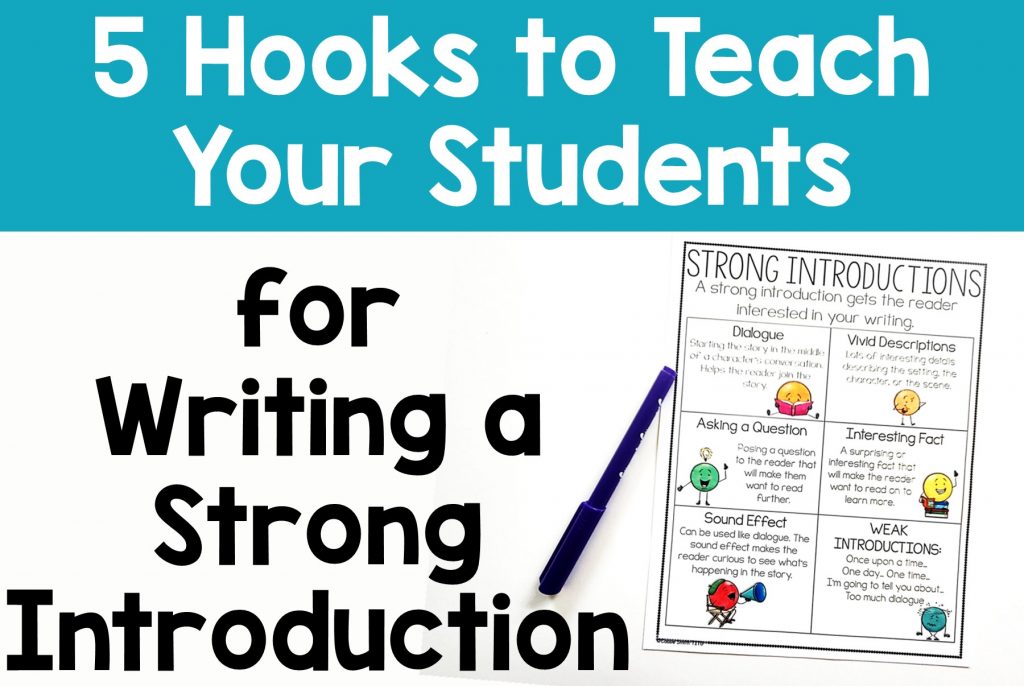
Meet Cassie
I’m Cassie Smith and I’m so glad you decided to stop by. I am passionate about creating engaging curriculum for teachers in grades K-5! I believe learning can be fun AND aligned to standards! Learn More
Looking for something?
- About Cassie
- ABCs of Salvation
- Privacy Policy
- Terms of Use
- Disclaimers
Let’s Connect
Get support.
Come join our Elementary Teachers Support Group on Facebook! You’ll be able to collaborate and get tips from thousands of teachers just like you!
Get a Surprise!
Sign up for our email list and we'll send a surprise freebie right to your inbox!
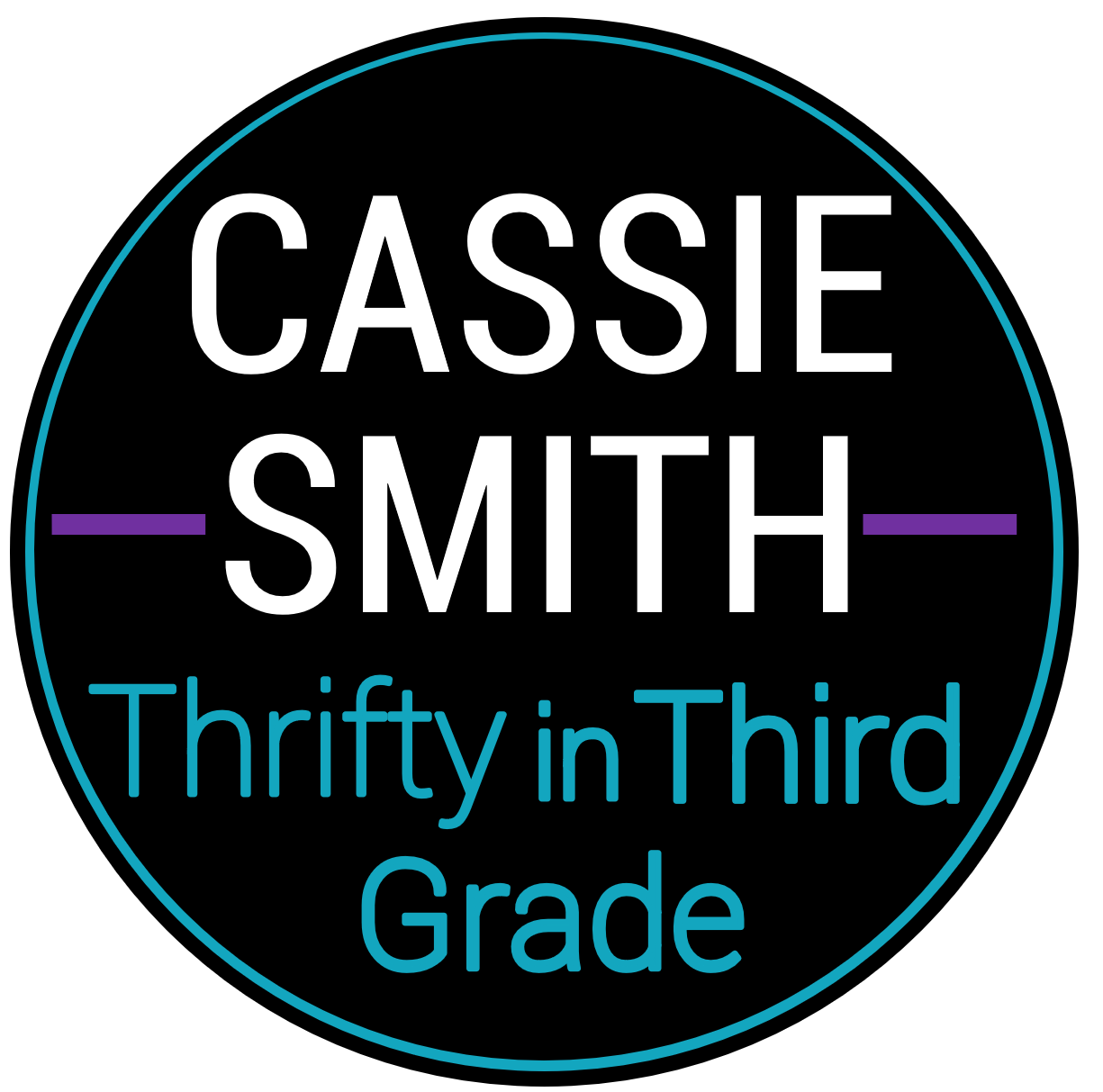
- Math for Kids
- Parenting Resources
- ELA for Kids
- Teaching Resources

How to Teach Skip Counting to Kids in 9 Easy Steps
10 Best Math Intervention Strategies for Struggling Students
How to Teach Division to Kids in 11 Easy Steps
How to Teach Place Value in 9 Easy Steps
8 Math Division Tricks: Making Division Fun & Accessible
Simple & Stress-Free After School Schedule for Kids of All Ages
When Do Kids Start Preschool: Age & Readiness Skills
Kindergarten Readiness Checklist: A Guide for Parents
How to Choose Best School For Your Kid: 12 Best Tips
Why Kids Get Bored at School: 10 Tips to Keep Them Interested
6 Effective Ways to Improve Writing Skills
40 Four Letter Words That Start With A
What Are the Stages of Spelling Development: Ultimate Guide
48 Rhyming Words for Kindergarten Kids
How to Teach Vowels to Kids: A Step-by-Step Guide
15 Best Innovative Tech Tools for Teachers
What is Teachers Professional Development: Strategies & More
11 Best Ways to Create a Positive Learning Environment for Kids
How to Encourage Creativity in the Classroom – 9 Best Tips
25 Best Websites for Teachers
100 Fun Writing Prompts for 4th Grade: Journal Prompts

- Journal Writing Prompts
- Descriptive Writing Prompts
- Fiction Writing Prompts
- Opinion Writing Prompts
- Funny Writing Prompts
- Informative Essay Writing Prompts
- Animal Writing Prompts
- Poetry Writing Prompts
- Narrative Essay Writing
- Emotion Writing Prompts
Writing help stimulates and organize thoughts in children. They make them better off expressing whatever they have in their mind and feel a little less burdensome.
But, how do we inspire young children to write?
Writing Prompts are a perfect genesis for developing writing habits in kids. They brew creativity, vocabulary, a sense of expression and so much more in them.
Without much ado, let’s get straight to the list of 4th grade writing prompts.
SplashLearn: Most Comprehensive Learning Program for PreK-5

SplashLearn inspires lifelong curiosity with its game-based PreK-5 learning program loved by over 40 million children. With over 4,000 fun games and activities, it’s the perfect balance of learning and play for your little one.
Here are more learning resources for your 4th grader to aid to their learning!
100 Fun Writing Prompts for 4th Grade

10 Journal Writing Prompts
It is important to develop self-expression in kids, which can be made possible through regular journaling. For kids as young as 4th graders, journalling can boost the flow of ideas and spark reflective communication in them. Refer to the list of 4th grade journal prompts and get your students on a writing fling.
1. What is a secret dream of yours? What can you do now to reach it later in your life?
2. What kind of a friend do you think you are? List three things where you can improve and become a better friend.
3. What is one thing that your teacher does that you don’t like? How would you like her to do that instead?
4. What is your favorite thing about being in the class?
5. Recount the best picnic you had with friends. Where did you go? What part did you enjoy the most?
6. Make a list of 30 things that you love about your life.
7. Who is your inspiration and why?
8. If you are allowed to make a single wish, what would it be?
9. Write about your favorite hobbies
10. Write about the best gift you have received. What made you love it so much?
10 Descriptive Writing Prompts
Somewhat similar to 4th-grade journal writing prompts, Descriptive prompts can be a great tap into creativity. When you want to keep your students busy with writing in a way that builds a love of details in them, here are the writing topics for 4th graders that you shouldn’t miss.
1. Write about 3 places that would like to travel to. Why and with whom?
2. Imagine your new classmate starts school today. What would you do to welcome them?
3. Describe a mistake you made and what you learned from it.
4. Your uncle overseas wants to know about your city. Write a letter to him describing your city- the famous monuments, eateries, parks, and more.
5. If you get to become a teacher for a day, which subjects will you teach and why?
6. Who inspires you in the family, and why?
7. Share your experience about a time when something unexpected happened.
8. Describe your favorite classmate. What is one more thing(s) that you would want to learn from him/her?
9. What is your favorite outfit? Why and where would you wear it?
10. You have found a lucky object. Share the little details about it.
10 Fiction Writing Prompts
What is life without fantasy and fiction? Precisely, nothing. Fiction is a powerful tool to pen down the flow of ideas without having to follow a particular format. It not only fuels creativity but improves writing skills and concentration. So, if you are planning to assay your student’s imaginative power, use these writing prompts for 4th grade.
1. Last night, you traveled into space. What did you see?
2. Put yourselves in the shoes of a mad scientist who just discovered a fruit. How does it look it? Narrate its journey from the innovative lab to the market.
3. In your favorite fairy tale, a prince decides to be a villain instead of a hero. Write the chain of events that unfold.
4. One day, you wake up to see that your elder brother has been turned into a horse by an evil witch. Build a story around the scenario.
5. On a lonely stormy night…Continue the story.
6. You have acquired a superpower to turn invisible whenever you like. Narrate the events of how and where you would use this superpower.
7. You were transported into the last story you read. Where are you? How would the story change with your presence?
8. Imagine you got a chance to climb up the ladder to the clouds. Write what you see there.
9. You woke up to find out that you have grown wings. How would your life change?
10. “Do not be angry” I told myself. But, as I looked down… Complete a story.
10 Opinion Writing Prompts

Supporting critical thinking and vision, Opinion writing prompts can be instrumental in shaping the thought process in young minds. More often than not, even the senior students are not aware of how many strong opinions they hold. Therefore, it becomes crucial to let kids practice how to present their arguments in their development years. Here’s a list of opinion writing prompts for 4th grade to kickstart their writing journey.
1. Should recess time be longer in schools? Why, or why not?
2. Should 4th graders receive pocket money from their parents? Why, or why not?
3. Share the best pizza eatery in your town. Why do you think it’s the best?
4. With the annual function coming up, your school wants to invite a famous personality to deliver an inspirational speech or presentation. Who do you think will be the best fit?
5. Would you rather be a class topper, a fine artist, or an excellent sportsperson?
6. Do you think smoking should be banned? Why, or why not?
7. Share your opinion on students bringing a cell phone to school.
8. Should everyone exercise every day? Share your opinion.
9. If you were to plan the school lunch menu, what will you include?
10. Is homework a good practice for learning? What do you think?
10 Funny Writing Prompts
Do you see your kids getting bored of writing on general topics? Don’t worry, refer to our list of fun writing prompts for 4th grade! Funny Writing Prompts are a great icebreaker to stir up the imagination and interest in students. Moreover, teachers can let students read aloud their fun stories in class. Get ready for a giggle-packed writing period with writing prompts for 4th grade!
1. Your homework was eaten by a dog. Write a story to convince your teacher.
2. Write a story using 5 words: funny, bird, sleep, guitar and pajamas.
3. Imagine you woke up and saw a giant sleeping next to you. Narrate the story.
4. Create a story where chocolate cake is the main character.
5. The rabbit jumped on the moon and the dish ran away with the spoon. Build a humorous story.
6. Imagine your best friend cannot stop sneezing and farting throughout the day. What do you think the day would look like to him?
7. Imagine someone cast a spell on your mother. She could talk nothing but only meow. How would your life change? What can you do to break the spell?
8. Everyone around you turns into a robot. How would you spend your day?
9. What would happen if you ate a cookie and became a dwarf? Narrate the scenario.
10. I never thought my cat would laugh… Continue the story.
10 Informative Essay Writing Prompts
The essence of Informative Writing prompts lies in how well students can convey particulars about an object, a personality, or an event to the readers. As much as they improve their writing skills, the prompts compel the young minds to think critically, and fetch cues from their memory and learning.
Check out the writing ideas for 4th grade kids on the list to make your work a little easier!
1. Write the importance of water in our lives. How can we save water?
2. What are traditions? Which one do you like the most and hate the most in your family?
3. Imagine you are a city tour guide. What are the best places to visit in your city?
4. What is the most interesting book you have ever read? Write a book review.
5. Write a ‘how to play’ guide for your favorite game.
6. Recollect the times you were in quarantine. Write an interesting story about how you overcame tough times.
7. How should we take care of our younger siblings?
8. You are at a farm with your family. Write all that you see around you.
9. Imagine you just experienced an earthquake. What was the first thing you did? Narrate the details.
10. You have become a store manager for a day. Write about all the responsibilities and tasks that you undertook throughout the day.

10 Animal Writing Prompts
We all agree that animals fit naturally into our stories. That’s because humans share an unbreakable bond with animals. So, why not have a writing session that features animals? This will surely infuse some excitement and divergent thinking in the classroom . Here’s some animal creative writing prompt for 4th graders!
1. Write some interesting facts that you know about animals.
2. How would it be if you woke up doing ‘meow meow’ one morning? Write a story.
3. Imagine dinosaurs taking over the world. What do they make humans do?
4. What if you are in a forest and a lion starts talking to you? What would the conversation be like?
5. If you were allowed to pet 5 animals, which one will you choose and why?
6. ‘A camel was walking in the desert but suddenly…’ Construct an interesting story.
7. Write a story about the friendship of a pigeon and squirrel living on the same tree.
8. Imagine you are swimming in the Indian Ocean and a shark arrives. What will you do?
9. Is the zoo a good place for animals? Why, or why not?
10. If you could have a superpower to turn into any animal, which animal would you become to save a girl who’s been kidnapped? Why?
10 Poetry Writing Prompts
In a world where classic literature has been lost under social media slang, poetry is still a breath of fresh air. Moreover, poems for kids can be really helpful in improving creative writing skills. They not only learn the real rules of literature and grammar but find joy in expressing themselves. Jump into the poetic world with these 4th grade writing prompts.
1. Write poetry about your first day in 4th grade.
2. Write a haiku about your favorite ice cream.
3. ‘Silvery sweet sound’… Continue the poem.
4. ‘There was once a wise man who told me’. Write a limerick using this line.
5. ‘I met a funny little man…’ Write an interesting poem.
6. Write poetry about Mother Earth.
7. ‘When the winter snow begins to fade…’ Continue the poem.
8. ‘The story is strange, as you will see, The weirdest thing ever happened to me.’’ Write a poem to describe the weirdest scenario you have been in.
9. ‘I woke up one morning with a mermaid tale’. Write a poem.
10. ‘Snow slips down swiftly’. Write a haiku.
10 Narrative Essay Writing
One of the widely practiced 4th grade writing prompts, Narrative writing is all about expressions and stories. It encompasses the beginning, middle, and end of a narrative. Whether it’s a personal incident or a fact or a fiction, it’s sure to spark a joy of creativity in young ones. Here are some ideas that you can use as 4th grade narrative writing prompts.
1. Suppose you become a school principal for a day. Write about what changes you will make in the school.
2. You have to describe your family members to someone who has never met them before. How will you do it?
3. If you had a chance to keep an extra chair at the dining table tonight, whom would you invite and why?
4. What is your favorite memory from 3rd grade? Share details about it.
5. What is one thing that makes you feel sad? How do you overcome this sadness?
6. Write about your favorite holiday meal.
7. When did you score poorly on a test? What did your parents say?
8. Write about your experience at a summer camp. Would you go this year again?
9. If given a chance to visit another planet, where would you go and why?
10. This year my goals are… Write about what all you want to achieve by the end of the year.
10 Emotion Writing Prompts
Just as adults need an outlet to express their bubbling emotions, so do kids! Journalling is a powerful tool, facilitating reflection and critical thought. While journalling might be a difficult step for most kids, writing prompts can support their creative outlet. It can aid them in expanding their own ideas, articulating their feelings, and boosting their confidence. Look at some interesting fourth grade journal prompts that kids will love!
1. Write a letter to your 15-year-old self.
2. What are 10 things you and your best friend are good at?
3. Describe your favorite time of the year. What activities do you do during this time? Who do you spend it with?
4. Imagine you found a genie who promises to grant you 3 wishes. What wishes would you make?
5. Write about a time you felt a strong emotion- be it happiness, sadness, anger, etc. What made you feel that way? What did you do to control it?
6. Suppose it is your mother’s birthday next week. How can you make it memorable for her? What planning will you do?
7. Do you know about your strengths and weaknesses? Write 5 each.
8. You have to thank 10 people today. Who will be on your list? How will you be thankful to them?
9. When someone compliments you, how do you respond to it?
10. Write about all the times you have felt happy in the last week.
12 Ways To Help 4th Graders With Writing

When it comes to giving a creative push to 4th graders, there can be nothing better than writing prompts. Since young students face more hurdles in following a structural approach to writing, prompts can help kids relieve that pressure. Consequently, they can enjoy flexibility in writing, allowing more room for creativity and imagination.
While kids may benefit immensely from writing prompts, it cannot be made possible without a mentor’s encouragement and support. Here are some of the creative ideas around 4th grade writing prompts that you can explore with kids:
- Encourage recollecting past experiences to stir up the writing process
- Give them friendly instructions
- Talk through building imaginary scenarios
- Respond actively to their communication and prompts
- Curating problem prompts and discussing the probable solutions
- Sharing classic tales or retelling them to fit the current scenario
- Jotting down facts to build creative prompts
- Emphasizing on development of opinionated argument
- Inspiring to write in a variety of styles
- Providing comprehensive support to build the writer’s confidence
- Highlighting authentic grammar rules and spelling
- Use of digital tools to create prompts
The above list is not exhaustive, and there’s always enough room for creativity.
To ease things for you, here are three steps you can consider while using writing prompts:
Step #1: Introduce the statement or topic to the students to steer the creative writing ship
Step #2: Encourage students to make a personal connection with the prompt given, and brainstorm the key points with them
Step #3: Convey the purpose of the writing assignment- an essay, a paragraph, or any other form of writing. Instruct the students using sufficient information to better equip them with writing cues.
Summing Up…
Young kids need support to build writing skills as much as adults do. Writing prompts can be a perfect anchor to get set kids on a writing spree. We hope the above 4th grade writing prompts can serve the enjoyment and purpose of your class! Good Luck!
Frequently Asked Questions (FAQs)
How can i improve my child’s writing skills using elementary prompts.
It is imperative to build focus in kids as young as 4th graders. Unfocused writing can become troublesome for them in the future. To improve focus, emphasize using basic prompts that encompass their favorite things- toy, place, picnic memory, cup, etc. Make a list of all that they like and ask them to write small details about them. Let them practice these as much as they want. This way, sticking to a single topic, will surely help them stay clear and focused until they start with longer essays.
How do I keep a tab on my child’s progress in writing?
Writing prompts are in themselves a great tool to help teachers and parents measure the progress of the kid. The best way to see whether the kid has improved or not is to let them practice with the elementary prompts daily. You must skim through them, and politely pinpoint the grammatical or punctuation errors.
However, do not be too harsh on them while communicating their mistakes to them. Remember, all good things take time! Moreover, do not compare your child’s progress to any other child. All children have different capacities and speeds to grasp things. Target steady growth!
How can I make writing prompts a fun activity for the class?
There are endless possibilities to creatively support the use of 4th grade journal prompts. You can divide the students into small groups and pin a challenge of writing prompts between them. Furthermore, teachers can make use of attractive resources like flashcards, worksheets, etc. to add a spark of enthusiasm and fun to the class.
Since little appreciation and kind words go a long way, you can keep exciting rewards for the kids who perform exceptionally. There’s so much that you can do to unleash the creative side of your 4th graders.
15 Best Listening Activities for Kids to Enhance Auditory Skills
15 Best Reading Fluency Activities for Early Learners
15 Best End of School Year Activities for Kids of All Grade

Most Popular

15 Best Report Card Comments Samples

101 Best Riddles for Kids (With Explanation)

40 Best Good Vibes Quotes to Brighten Your Day
Recent posts.

Math & ELA | PreK To Grade 5
Kids see fun., you see real learning outcomes..
Watch your kids fall in love with math & reading through our scientifically designed curriculum.
Parents, try for free Teachers, use for free

- Games for Kids
- Worksheets for Kids
- Math Worksheets
- ELA Worksheets
- Math Vocabulary
- Number Games
- Addition Games
- Subtraction Games
- Multiplication Games
- Division Games
- Addition Worksheets
- Subtraction Worksheets
- Multiplication Worksheets
- Division Worksheets
- Times Tables Worksheets
- Reading Games
- Writing Games
- Phonics Games
- Sight Words Games
- Letter Tracing Games
- Reading Worksheets
- Writing Worksheets
- Phonics Worksheets
- Sight Words Worksheets
- Letter Tracing Worksheets
- Prime Number
- Order of Operations
- Long multiplication
- Place value
- Parallelogram
- SplashLearn Success Stories
- SplashLearn Apps
- [email protected]
© Copyright - SplashLearn

Make study-time fun with 14,000+ games & activities, 450+ lesson plans, and more—free forever.
Parents, Try for Free Teachers, Use for Free
4th Grade Writing Prompts
Hero Images/Getty Images
:max_bytes(150000):strip_icc():format(webp)/squareheadshot-5b6da9aec9e77c0050a6e8a5.jpg)
Students in fourth grade need varied practice developing their writing skills. According to the Common Core State Standards Initiative , fourth-grade writing should include opinion pieces, informative or explanatory texts, and narratives about real or imagined experiences. Additionally, a fourth-grade writing curriculum should include short research projects.
These writing prompts offer diverse forms of inspiration for every student.
Opinion Essay Writing Prompts
In an opinion essay , students must state their opinion and back it up with facts and reasons . Ideas should be organized logically and supported by details.
- Best Friends Forever. Write an essay explaining what makes your best friend the best best friend.
- Awesomeness. Describe the most awesome thing about being in fourth grade.
- New Worlds. Would you rather help start a colony on a new planet or a city under the ocean? Why?
- School Food. Name one thing you would like to change about your school’s menu and explain why.
- Someday. If you could be a race car driver, an astronaut, or president of a country, which would you choose and why?
- Cityscapes . If you had a friend visit from another state, what is the one place in your city you would insist he or she had to see? What makes this place so special?
- Shipwrecked. You find yourself stranded on a deserted island with only three items in your backpack. What would you want those items to be and why?
- Flat Earth. Some people still believe that the Earth is flat . Do you agree or disagree? Include supporting facts.
- Extra! Extra! Name one class, sport, or club you wish your school offered and explain why it should be available.
- Seasons. Which season is your favorite and why?
- One-star . What is the worst book you have ever read and what made it so terrible?
- Fandom. Who is your favorite TV, movie, or music star? What makes him or her the best?
- Progress. Identify a way in which you would like to improve as a student this school year. Explain why you would like to get better and list some steps you can take to make it happen.
Informative Essay Writing Prompts
When writing an informative or explanatory essay, students should introduce the topic clearly, then develop the topic with facts and details. When explaining a process, students should outline the steps in a logical order.
- Bullied. Explain how you would handle being bullied and the steps you would take to stop a bully.
- Mad Skills. Describe an unusual talent, hobby, or skill that you possess.
- Cuisine. Describe a food that is unique to your family or area of the world to someone who has never tasted it.
- Role Model. Think of a person who has made an impact on your life and describe the role they’ve played.
- Pay It Forward. What is one thing you would like to do—either now or in the future—to make the world a better place?
- Packing. Explain the most effective way to pack for a trip to ensure that you have everything you need.
- Wild Kingdom. Of all the animals wild or domesticated, write about your favorite. Include interesting facts about this animal in your essay.
- Gaming. Explain how to play your favorite video or board game to someone who has never played it before.
- Problematic. Describe a problem you’re facing and three ways you could possibly solve it.
- Extreme Weather. Choose an extreme weather condition or a natural disaster such as a tornado or a volcanic eruption. Explain its causes and effects.
- Sweet Treats. Explain the process of making your favorite dessert.
- Learning Styles. Think of the way you prefer to learn, such as by reading, listening, or doing. Explain why you think you learn best that way.
- Edison. Thomas Edison said that he didn’t make mistakes, he just learned 10,000 ways not to make a light bulb. Describe a mistake you made and the lesson you learned from it.
Narrative Essay Writing Prompts
When writing narrative essays about real or imagined experiences, students should use descriptive details and logical sequence. They can use dialogue and sensory details to develop their essay .
- Microscopic Details. Imagine being microscopic. Describe an adventurous trip through your body.
- Alone. You find yourself locked in your favorite store alone overnight. Where are you and what do you do?
- Homeless. A friendly stray dog follows you home from school. What happens next?
- Time Travel. Imagine you could travel back in time to when your mom or dad was your age. Write an essay about your relationship with your fourth-grade parent.
- Mismatched. Write a story about someone your age. The story must include a giraffe, a mouse, a flying carpet, and a large birdcage.
- Pet Peeve. Recount a moment when something really got on your nerves. Describe the experience and why it irritated you so much.
- Surprise! Think of a time your teacher surprised your class. Describe what happened and how the class reacted.
- Special Moments. Think of a specific day or event that you will always remember. What made it so special?
- Travel Through History. Imagine you could travel back in time to live through one event from history . Describe the event and write about your experience.
- The Most Terrible Day. Write an essay about a day when everything went wrong. How did the day start and end, describe the experience.
- Road Trip. Write about a favorite family vacation or road trip. Where did you go? What made it special?
- Funny Pet Tricks. Can your pet do a funny or unusual trick? Describe it.
- President. If you could be president for a day (or the principal of your school), what would you do?
Research Project Essay Writing Prompts
Fourth-grade students should also complete short research projects using books, magazines, and online sources . Students should take notes and provide a list of the sources they used in their research.
- New Puppy. You want a new puppy. Do some research to determine the best breed for your family and write about it.
- Battles . Research and write about what you consider the most significant or famous battle in history.
- Famous People. Choose a famous person from history or science and write about their lives and contributions.
- Animal Kingdom. Select an animal to research. Include facts about its behavior, habitat, and diet.
- Countries. Choose a country. Investigate its culture and holidays, and find out what life there is like for kids your age.
- States. Pick a state you’ve never visited. Learn three to five unique facts about the state to include in your essay.
- Inventions. What do you think is the greatest or most useful invention of all time? Find out who invented it and how and why it was invented.
- Native Americans. Choose a Native American tribe. Learn about where they lived, their culture, and their use of natural resources in their area.
- Endangered Species. Research and write about an animal that is endangered. Include facts about why it is endangered and any changes that people can make to help increase its population.
- Fine Arts. Learn more about an artist or composer. Include facts about their life and death and most well-known works.
- Authors. Research an author whose books you enjoy. Include facts about what inspired him or her to start writing.
- Dig Deeper. Research something you’ve studied in history, science, or literature but would like to know more about.
- State Standouts. Choose a famous person from your state. Learn about his or her life and contributions.
- Engaging Writing Prompts for 3rd Graders
- Second Grade Writing Prompts
- Writing Prompts for Elementary School Students
- Personal Essay Topics
- January Writing Prompts
- First Grade Writing Prompts
- February Writing Prompts
- Fun March Writing Prompts for Journaling
- November Writing and Journal Prompts
- 24 Journal Prompts for Creative Writing in the Elementary Classroom
- Martin Luther King Jr. Writing Prompts
- September Writing Prompts
- Writing Prompts for 5th Grade
- December Writing Prompts
- How to Write a Narrative Essay or Speech
- May Writing Prompts
Writing Prompts for 4th Grade: Fostering Creativity
Most teachers would agree that unleashing 4th graders' imagination through writing is crucial, but can be challenging.
This article will provide an abundance of creative writing prompts for 4th grade to foster imaginative thinking and writing skills.
You'll discover prompts across narrative, descriptive, opinion and essay writing, including historical adventures, natural disasters, character dialogues, imaginary worlds and more. There are also sample writings and effective strategies to implement these prompts.
Unleashing Imagination with Writing Prompts for 4th Grade
Creative writing is an important part of a 4th grader's development. It helps build critical thinking skills , enhance vocabulary, and gives students an outlet to express their thoughts and ideas. As an educator, implementing engaging and thoughtful writing prompts is key to nurturing your students' creativity.
Understanding the Role of Creative Writing in Grade 4
Creative writing allows students to tap into their imagination. As 4th graders begin thinking more abstractly, creative writing provides an opportunity for them to stretch their minds. Benefits include:
- Strengthens ability to develop stories and express ideas
- Allows students to explore interests more deeply
- Builds vocabulary and language skills
- Develops planning, organizing, and editing abilities
- Boosts creativity and imagination
By giving students open-ended creative writing prompts, they can engage with topics that excite them. This leads to more involvement in the writing process.
Effective Strategies for Implementing Writing Prompts
Here are some tips for successfully integrating creative writing prompts into your 4th grade curriculum:
- Set clear expectations - Discuss the goals of creative writing and what you hope students will get out of the experience. Establish guidelines for length, format, etc.
- Inspire ideas through class discussions - Have students brainstorm prompt ideas together. Capture their thoughts on the board.
- Give students options - Offer a choice of several prompts or let them develop their own based on interests.
- Allow time to organize ideas - Before writing, have students map out key points. Outlining helps them structure their thoughts.
- Encourage creativity - Stress that creative writing has no right or wrong answers. The goal is to tap into imagination.
Setting the Stage for Creative Writing
The writing prompts covered aim to spark creativity across three styles:
Narrative - Students develop storytelling skills. Prompts inspire the use of description, plot building, and character development.
Descriptive - Prompts allow students to practice describing people, places, objects or events using vivid sensory details.
Opinion-based - Students state their perspective and support it with reasons, facts and examples. Prompts inspire logical reasoning.
Preview of Creative Writing Topics for Grade 4 with Answers
Providing sample responses for some prompts guides students. It allows them to compare their writing style, perspective and ideas. Sample answers also spark further thought and creativity.
What should a 4th grader be able to write?
By the end of 4th grade, students should have a solid grasp of basic writing skills that will enable them to express their ideas creatively. Here are some of the key writing milestones 4th graders should reach:
Writing Skills
- Understand parts of speech like nouns, verbs, adjectives
- Compose a structured paragraph with a clear topic sentence, supporting details, and concluding sentence
- Use proper punctuation including commas, apostrophes, and quotation marks
- Write with proper spelling, grammar, and sentence structure
- Organize ideas logically in writing
Types of Writing
Some examples of writing 4th graders should master include:
- Structured Essays : With an introduction, body paragraphs, conclusion
- Creative Writing : Stories, poems, plays that spark imagination
- Opinion Pieces : Take a stance and back up viewpoint with reasons
- Informative Writing : Research reports on topics like science, history
Sample Writing Prompts
Here are some example prompts to encourage 4th graders to write creatively:
- Imagine you could have any superpower. What would it be and why?
- Write a story about someone who discovers something special in their backyard.
- Do you think kids should have chores? Why or why not?
- Describe your perfect day. What would you do from morning to night?
With the right prompts and guidance, 4th grade writers can unlock their creativity and grow their skills substantially by the end of the year. The key is providing engaging topics tailored to their interests and skill level.

What is the story writing prompt for Grade 4?
Writing prompts can be a great way to get 4th grade students excited about creative writing. Here are some effective story writing prompts to try in the classroom:
Describe something that you saw in the news recently and how it made you feel.
This prompt helps students connect current events to their own lives and emotions. Some questions to scaffold this prompt:
- What recent news story caught your attention? Why?
- How did it make you feel? Why did you have that reaction?
- If you could talk directly to the people involved, what would you want to say?
Tell about an event that happened recently at your school or in your town.
This taps into students' own immediate experiences and lets them tell a factual story. You can have them recount a field trip, assembly, game, or community event.
Some scaffolding questions:
- Set the scene - where and when did it happen? What were you doing beforehand?
- What happened first? Next? Last?
- How did people react? How did it end?
- What did you learn or how were you changed?
What do you think is one of the world's biggest problems right now, and how would you solve it?
This prompt lets students grapple with global issues and envision creative solutions. They can pick issues like poverty, pollution, endangered animals, war, etc.
- What global problem concerns you and why? Give some background details.
- Who is affected and how? Why does it persist as an issue?
- Brainstorm possible solutions. Choose one to explain in more detail - how would it realistically work?
- What difference could it make if implemented?
Following a scaffolded discussion, students can then write a story integrating their thoughts and solutions.
What are some amazing creative writing prompts?
Here are some fun and engaging creative writing prompts to get your 4th grade students excited about writing:
Describe Your Perfect Day
- Imagine you woke up and could do anything - where would you go, who would you meet, what would you do? Let your students' imaginations run wild as they describe their perfect day.
If I Had a Magic Wand...
- If your students had a magic wand and could make anything happen, what would they do? Turn a bully into a frog? Get an endless supply of candy? This silly prompt sparks creative ideas.
Write a Letter to Your Future Self
- Have students write a letter to their future selves, predicting what their life will be like in 5, 10 or 20 years. They can describe their imagined future career, family, hobbies, travel adventures, and goals.
You're a Superhero - What Are Your Powers?
- Unleash your students' inner superheroes! Have them develop their superhero name, costume design, special powers, sidekick, and arch nemesis. Then describe a short adventure.
You Find a Mysterious Box
- Students imagine they find a mysterious box on their way home from school. What's inside? This prompt encourages creativity as they describe the box, their reaction to discovering it, and what happens when they open it. The possibilities are endless!
Focusing creative writing prompts on imaginative ideas, as opposed to formulaic essay structures, allows 4th graders to fully engage their minds and express themselves. Try out a few of these prompts to foster creativity in your class!
What are the four writing prompts?
Writing prompts are a great way to get 4th grade students excited about writing while building critical skills. Here are four types of prompts that can foster creativity:
Descriptive Writing Prompt
Describe the best party you have ever attended. This allows students to use vivid sensory details and figurative language.
Expository/Informative Writing Prompt
Describe the process of making your favorite meal. This structures writing logically and sequentially.
Narrative Writing Prompt
If you could be in charge of the world for one day what would you do? This sparks imagination through storytelling.
Opinion/Persuasive Writing Prompt
What is the best pet to have? Why? This builds reasoning and evidence to support claims.
Mix up these four types of prompts to keep writing fresh and engaging. Encourage students to use dialogue, emotional appeals, facts and reasons, natural disaster metaphors, references to inspirational figures like Thomas Edison, and other creative techniques in their essays. Provide samples of excellent 4th grade writing for models.
Set aside regular time for writing prompts. Establish a routine where students develop their essays, you give constructive feedback, and they revise their work. This consistency, along with creative topics, builds essential writing skills.
sbb-itb-bb2be89
Narrative writing prompts: crafting stories in 4th grade.
Narrative writing prompts encourage 4th grade students to let their imaginations run wild while developing essential storytelling skills. As students craft tales filled with suspense, adventure, and compelling characters, they enhance their ability to construct cohesive plot lines and lifelike narratives.
Adventures with Historical Figures: A Tale with Thomas Edison
Challenging students to blend facts and fiction, this prompt asks them to write a story featuring famed American inventor Thomas Edison as a character. After researching key events and inventions in Edison's life, students can build an imaginative adventure tale involving the inventor. This allows them to develop their creativity while reinforcing knowledge of history.
Surviving a Natural Disaster: Imaginative Resilience
This prompt requires students to write a first-person narrative about living through a natural disaster like a hurricane, flood or earthquake. As they vividly describe facing and overcoming adversity, students build suspense while exploring themes of courage and resilience.
Dialogues and Drama: Mastering Character Interaction
By asking students to write scenes featuring dialogues between two or more characters, this prompt focuses on enhancing their ability to write expressive, impactful conversations. As students consider factors like tone, motivation and personality while crafting dialogues, they gain stronger command of language.
4th Grade Writing Samples: Learning from Examples
Exposing students to high-quality narrative samples written by their own peers allows them to analyze effective storytelling techniques. Noticing elements like descriptive language, pacing, narrator perspective and more in exemplary samples helps students incorporate such best practices into their own narratives.
Descriptive Writing Prompts: Painting Pictures with Words
Descriptive prompts can help 4th graders practice using sensory details and descriptive language in their writing. Here are some ideas to get students imagining and describing vivid scenes.
Bringing Characters to Life: Descriptive Details
- Imagine a new student joining your class. Describe what they look like and their personality using lots of descriptive adjectives.
- Describe your best friend so clearly that a stranger could recognize them. Use details about their appearance, style, personality, quirks, and anything else that makes them unique.
Exploring Imaginary Worlds: Descriptive Writing for Grade 4 PDF
Here is a downloadable PDF with descriptive prompts focused on building fantastical settings:
4th Grade Descriptive Writing Prompts PDF
The prompts in this PDF encourage students to describe imaginary places using strong sensory language that engages the reader's imagination.
Capturing Moments in Time: Describing Events
Ask students to describe an event or scene in vivid sensory detail, as if capturing a photograph with words. Prompts could include:
- Describe your perfect birthday party. Use sights, sounds, smells and other descriptive details to bring the event to life.
- Imagine you could travel anywhere in the world. Describe your destination using all five senses - what do you see, hear, feel, taste, and smell?
Descriptive Writing Techniques and Examples
Here are some descriptive writing techniques to share with students:
- Similes and metaphors - compare things using "like" or "as"
- Adjectives - describe nouns with colorful descriptive words
- Alliteration - repeat the same first letter or sound
- Onomatopoeia - use words that imitate sounds
Provide examples of descriptive passages from literature to illustrate effective techniques. Analyze the word choices and descriptive language with students.
Using vivid sensory details in their writing helps students paint clearer pictures for the reader. These descriptive prompts will get their imaginations active and enhance their skills.
Opinion Writing Prompts: Expressing Views and Arguments
Opinion prompts encourage 4th graders to develop persuasive writing skills by articulating their viewpoints and supporting them with logical reasoning. As students construct opinion-based essays, they learn how to effectively convince readers of their perspective.
Crafting an Opinion Essay: From Start to Finish
When introducing an opinion essay, first explain the basic structure to students:
- Start with an opening paragraph stating their viewpoint clearly. Help them come up with a strong thesis statement.
- In the body paragraphs, ask them to provide facts, examples, expert opinions, statistics, etc. to convince readers. Teach students how to find reliable sources and cite references.
- Conclude by restating their viewpoint assertively and urging readers to agree with their perspective.
Then provide thought-provoking prompts for them to write full-fledged opinion essays, putting this structure into practice.
Debating Current Issues: Encouraging Critical Thinking
Creating prompts around current events and issues teaches students to form educated opinions on real-world topics. Provide prompts that spark friendly debates around themes like:
- Should mobile phones be allowed in elementary schools?
- Should students wear uniforms at school?
- Should physical education be mandatory every day at school?
Urge them to consider multiple perspectives before stating their own views. This builds critical thinking abilities.
Persuading Peers: The Art of Argumentation
Craft prompts that let 4th graders try convincing their classmates about everyday issues like:
- Why we should have longer recess breaks
- Why dogs make better pets than cats
- Why pizza is the best food ever
These fun, friendly debates boost their persuasive writing skills.
Using Evidence to Support Opinions
When students simply state opinions without logical facts, prompt them to defend their views by asking:
- What evidence supports your opinion?
- Can you back your view with expert opinions or scientific research?
This reiterates the importance of using evidence over unfounded personal beliefs.
Developing Essay Writing Skills in 4th Graders
Helping students develop strong essay writing skills at an early age sets them up for academic success. As educators, we can provide 4th graders with the fundamentals to craft clear, coherent essays.
Essay Writing Basics: Structure and Flow
When introducing essay structure, explain the key components:
- Introduction - Contains a hook to grab interest, background context, and a clear thesis statement.
- Body - Includes 2-3 paragraphs elaborating on the thesis with supporting details, facts, examples, etc. Use transition words to connect ideas.
- Conclusion - Summarizes main points and reinforces the thesis statement.
Model writing a basic 5-paragraph essay to demonstrate proper structure and flow from introduction to conclusion.
Enhancing Coherence: Transition Words and Phrases
Teach students transitional phrases to effectively move between ideas and paragraphs, improving coherence. Useful examples include:
- To add information: additionally, besides, furthermore
- To compare: similarly, by contrast, however
- To sequence: first, second, third
Have students highlight transitions in example essays, discussing how they are used.
Refining Writing: Editing and Revising Techniques
Strategies to improve essay clarity and readability:
- Read aloud to catch awkward phrasing
- Check formatting of paragraphs, fonts, etc.
- Simplify language by replacing complex vocabulary with simpler words
- Add descriptive details through imagery, analogies, examples etc. to illustrate points
Practicing with Prompts: Building Confidence and Skill
Regular practice responding to diverse essay prompts allows students to expand skills. Tailor prompts to curriculum topics students are covering to make connections. Establish a weekly writing prompt routine. Assess growth by comparing earlier and later writing samples.
With scaffolding and consistent practice, 4th graders can gain essay writing proficiency to communicate ideas clearly.
Conclusion: Reflecting on the Journey of Creative Writing
Creative writing prompts can play an invaluable role in developing essential skills for 4th grade students. By encouraging imagination, self-expression, and critical thinking, they set the stage for future writing success.
In this article, we explored various types of creative prompts that spark ideas and get young writers actively crafting stories, poems, dialogues, and more. When students repeatedly practice creative writing, they build confidence and comfort with sharing their thoughts and ideas. Over time, these exercises strengthen their vocabulary, sentence fluency, and other language arts abilities.
As educators, we want to nurture our students' creativity while also developing their composition skills. An effective balance of structure and freedom in writing tasks allows room for imagination as well as skill-building. While creative prompts open doors to new perspectives, targeted drafting and revision activities hone technique.
By blending imaginative prompts with formal instruction, we can send 4th graders on a rich journey toward masterful writing. Our aim is for students to discover their unique voices while also learning to organize, clarify, and polish their work. When creative expression drives the writing process, young authors remain engaged and find joy in developing their skills. By keeping this spark lit, we equip students to meet 5th grade writing standards while pursuing their passions.
Related posts
- Spelling Words for 5th Grade: Classroom Activities
- Teaching Resources for Teachers: Cultivate Critical Thinking
- How to Develop Critical Thinking Skills in Students
- Engaging Writing Prompts for 3rd Grade Classrooms
Mastering Math: Creative Approaches to Teaching Numbers and Operations

Fostering a Growth Mindset: Encouraging Resilience and Perseverance in Students

Of Mice and Men: Book Review for Teachers
Become a buddy..
Join 500+ teachers getting free goodies every week. 📚

Grade 4 Writing Prompts
25 inspiring fourth grade writing prompts.

Get your child's imagination flowing with these wonderful, Grade 4 writing prompts!
Story starters
“if i was…”, general prompts.
- I awoke from my dream and…
- Samantha looked out of her window and saw…
- There was a bright flashing light in the distance…
- I was frozen to the spot, afraid to move because…
- James didn’t realize it yet, but…
- If I was president…
- If I was a teacher…
- If I was an astronaut…
- If I was an engineer…
- If I was an adventurer…
- Has technology improved the world?
- Should students be allowed to choose what to study?
- Should violent video games be banned?
- Can you buy happiness with money?
- How can we slow down global warming?
- How will people travel in 100 years?
- Describe the perfect robot. What features does it have and what can they do?
- Invent a new game and write instructions for it.
- Invent a new tasty smoothie!
- Describe the home of the future.
- If you had one million dollars, how would you spend it?
- What would it be like to live with an elephant?
- What job would you like to have when you are older, and why?
- If you could have a super power, what would it be?
- What would be in your ideal meal? Use all of your senses to describe it in detail.
How Night Zookeeper can help

Night Zookeeper makes writing fantastically fun for children aged six to twelve!
Our language arts program for kids can help to improve your child's skills while keeping them engaged, focused, and entertained! Our extensive range of writing activities provide children with thousands of creative writing prompts, interactive lessons, and challenges to ensure steady progression. We also offer personalized feedback from real teachers on all the work submitted on the program.
Sign up today and get a 7-day FREE trial!
More writing prompts & activities
- Grade 4 Picture Writing Prompts
- Grade 4 Writing Activities
- Creative Writing Prompts for Kids
- Elementary Writing Prompts
- Elementary Writing Activities
Related content
- Elementary Language Arts
- Elementary Writing Curriculum
- Language Arts Resources

Make Reading & Writing Fantastically Fun!
- Award-winning reading & writing program for kids
- Improves spelling, grammar, punctuation & vocabulary
- Over 1,000 different learning games and activities

50 Exclusive 4th Grade Writing Prompts That Are Printable For Free
- February 20, 2024
Table of Contents Hide
- What Are The Benefits of 4th-Grade Writing Prompts?
Narrative Writing Prompts:
Persuasive writing prompts:, descriptive writing prompts:, informative writing prompts:, bonus prompts:, how to use 4th grade writing prompts in the classroom, we also recommend.
Writing is an essential skill that students need to develop at a young age. By providing them with interesting writing prompts, you can encourage creativity, critical thinking, and language development.
Are you looking for engaging and creative writing prompts for your 4th-grade students? Look no further! We have compiled a list of 50 exclusive writing prompts that are not only fun and exciting but also printable for free.
Whether you are a teacher looking for new writing prompts for your classroom or a parent wanting to support your child’s writing development, these 50 exclusive prompts will inspire and motivate young writers to express themselves and hone their writing skills. So, grab a pencil and paper, and let the creative writing begin!
What Are The Benefits of 4th-Grade Writing Prompts ?
Writing prompts offer a treasure trove of benefits for 4th graders, both in terms of academic development and personal growth. Here are some key advantages:
For the learner:
- Boost creativity and imagination: Spark out-of-the-box thinking and encourage unique storytelling concepts.
- Develop essential writing skills: Hone grammar, vocabulary, and sentence structure in a fun and engaging way.
- Increase confidence in writing: Provide achievable challenges and opportunities to showcase creativity.
- Foster critical thinking and argumentation: Prompt persuasive prompts that encourage logical reasoning and expressing opinions.
- Cultivate curiosity and exploration: Spark interest in various subjects and motivate research and learning.
- Promote self-expression and emotional exploration: Give children a platform to share feelings and explore different perspectives.
SEE ALSO: 15 Different Types of Tones in Writing: Must-Know Guide for All Writers
For the parent/teacher:
- Free and readily available: No need to break the bank or scour the internet for new prompts.
- Printable and convenient: Easily access and use them in various settings, classrooms, or family time.
- Diverse and engaging: Offer a variety of genres and topics to cater to different interests and learning styles.
- Spark discussion and collaboration: Use them as starting points for family storytelling nights or classroom activities.
- Support curriculum alignment: Easily find prompts that complement specific lessons or learning objectives.
- Reduce screen time: Offer an alternative to passive entertainment and encourage creative expression.
50 Exclusive 4th Grade Writing Prompts
Writing helps stimulate and organize thoughts in 4th-grade children. They make them better off expressing whatever they have in their mind and feel a little less burdensome.
Let’s take a look at the different writing prompts for 4th-grade students:
Related Post: 107+ Creative Writing Prompts For Middle School Students
- You wake up one morning to find your pet has superpowers! What happens next?
- You discover a hidden door in your attic that leads to a secret world. Describe what you find there.
- You and your best friend shrink down to the size of ants. What adventures do you have?
- You find a genie in a bottle. What are your three wishes?
- You are the main character in your favorite book. What happens when the story takes an unexpected turn?
- You find a magic notebook that writes your wildest dreams into reality. What chaos ensues?
- Your school suddenly announces a time travel field trip. Where and when do you go?
- You discover a talking animal hiding in your backyard. What secrets does it reveal?
- You’re chosen to compete in a wacky intergalactic talent show. How do you wow the judges?
- You wake up to find everyone in your family has switched bodies! How do you get things back to normal?
- Should schools have a longer recess? Why or why not?
- What is the best way to spend a summer vacation?
- Convince your parents to let you get a pet.
- What is your favorite book? Write a review to convince others to read it.
- You are running for class president. Write a speech to persuade your classmates to vote for you.
- Why should homework be abolished? Or, is it actually beneficial?
- Is technology making kids smarter or lazier? Argue your side.
- Convince your teacher to let you have a classroom pet.
- You believe your school mascot is outdated and needs an upgrade. Propose a new one.
- Would you rather have superpowers or win the lottery? Defend your choice.
- Describe your favorite place in the world in as much detail as possible.
- Imagine you are a cloud. Describe what you see as you float across the sky.
- You are lost in a forest. Use your senses to describe what you see, hear, smell, taste, and touch.
- Create a portrait of your best friend using only words.
- Describe a delicious meal in detail, making your reader’s mouth water.
- Describe the feeling of your favorite childhood memory in vivid detail.
- You are a tiny raindrop on a journey down a windowpane. Describe your adventure.
- Create a character based solely on their laugh. Describe them and their personality.
- Imagine you can taste emotions. Describe the taste of happiness, sadness, and anger.
- You are exploring a mysterious cave. Describe what you see, hear, and feel with suspense.
- Research a famous person you admire and write a biography about them.
- How do bees make honey? Explain the process clearly and concisely.
- Write a report about your favorite animal. Include interesting facts about its habitat, diet, and behavior.
- Create a travel brochure for your dream vacation destination.
- Explain the rules of your favorite game to someone who has never played it before.
- Research a natural disaster and explain how it forms and its impact.
- How do airplanes fly? Explain the science behind it in a way kids can understand.
- Write a step-by-step guide on how to bake your favorite dessert.
- Research a historical event and present it as a news report.
- Explain the importance of recycling and reducing waste.
Read Also: 140 Exclusive Writing Prompts For Adults
- Write a poem about your favorite season.
- Create a comic strip about a funny experience you had.
- Write a song about your hopes and dreams.
- Design a new invention that would make the world a better place.
- Write a letter to your future self. What advice would you give yourself?
- Write a limerick about a silly creature you invent.
- Create a puzzle based on your favorite book or movie.
- Design a board game with unique rules and challenges.
- Write a script for a short play starring your classmates.
- Compose a haiku poem about a beautiful natural scene.
Are you interested in learning how to write proposals? Read our article on Proposal Writing: 7 Steps to Writing the Perfect Proposal
Here’s how to utilize 4th Grade Writing Prompts in the Classroom
- Encourage Creativity : Writing prompts are designed to spark creativity. Encourage students to let their imagination soar by using the prompts as a launchpad for inventive and original ideas.
- Developing Writing Skills : Prompts serve as excellent tools to enhance specific writing skills. Teachers can tailor prompts to focus on areas like descriptive writing, narrative storytelling, persuasive arguments, or informative essays.
- Promoting Critical Thinking : Some prompts are crafted to provoke critical thinking. Encourage students to analyze the prompt, consider different perspectives, and develop well-reasoned responses.
- Incorporate Varied Genres : Writing prompts offer the opportunity to explore different genres of writing. From fiction to non-fiction, poetry to opinion pieces, prompts can introduce students to a diverse array of writing styles.
- Individualized Learning : Recognize that each student is unique. Tailor prompts to accommodate various learning styles, interests, and abilities. This individualized approach fosters a more engaging and personalized writing experience.
Tips for Teachers and Parents
- Provide Positive Feedback : Offer constructive and positive feedback on responses to writing prompts. Encouragement fosters a positive attitude towards writing.
- Facilitate Peer Reviews : Incorporate peer review sessions where students can share and receive feedback on their prompt responses. This promotes collaborative learning and a sense of community.
- Regular Integration : Consistency is key. Regularly integrate writing prompts into lesson plans or home activities to make writing a routine practice.
Incorporating 4th-grade writing prompts into the learning journey is a dynamic and effective approach to enhancing writing skills. By encouraging creativity, developing specific writing abilities, and fostering critical thinking, these prompts play a pivotal role in shaping young writers. Whether in the classroom or at home, embracing the versatility of writing prompts contributes to a well-rounded and engaging writing education for 4th-grade students.
- What Is A Contraction In Writing? Definition, How To Use, and Examples
- What is UX Writing? Job Descriptions, Skills, Salary.
- Types Of Freelance Writing | Descriptions And Jobs
- 10 Tips on How to Increase Readability Score While Writing
Related Posts
Writersgig review 2024: worth it for beginners .
- March 20, 2024
50 Exclusive 5th Grade Writing Prompts That Are Printable For Free
- February 28, 2024
How to Preview a Submitted Content on WritersGig
- February 16, 2024

4th Grade Writing Prompts with Passages PDF: Explore Reading and Writing
My name is Debbie, and I am passionate about developing a love for the written word and planting a seed that will grow into a powerful voice that can inspire many.

Writing Prompts: A Pathway to Explore Reading and Writing in 4th Grade
Engaging passages: enhancing reading and writing skills in 4th grade students, promoting critical thinking: developing analytical skills with writing prompts, connecting fiction and non-fiction: broadening horizons through writing prompts, strengthening language skills: enhancing vocabulary and grammar through writing prompts, encouraging creativity: unleashing imagination with exciting writing prompts, unleash your imagination with exciting writing prompts, building confidence: boosting writing proficiency in 4th grade students, frequently asked questions, concluding remarks.
Engaging 4th graders in the world of reading and writing can be an exciting journey! One effective tool that can foster their creativity and language skills is the use of writing prompts. These prompts serve as creative springboards that encourage students to explore various themes, develop their thoughts, and express themselves through writing. Here, we’ll delve into how writing prompts can enhance the reading and writing experience for 4th graders, fostering a deeper understanding and appreciation of language.
Writing prompts provide an open door to creativity by presenting students with specific topics or situations to imagine, ponder, and write about. They serve as excellent catalysts to spark their creativity and can be tailored to suit different learning styles and interests. By exploring these prompts, 4th graders can expand their vocabulary, strengthen their grammar and punctuation skills, and enhance their overall written communication.
- Writing prompts allow students to explore their imagination.
- They encourage critical thinking and problem-solving skills .
- Prompts provide an opportunity to practice various writing genres such as narratives, persuasive writing, and descriptive passages.
- Students can develop empathy and emotional intelligence through writing prompts that tackle personal experiences or moral dilemmas.
- Exploring prompts helps students step outside their comfort zone, refining their stylistic choices and experimenting with different literary devices.
As 4th graders engage with writing prompts, they also develop a deeper connection to reading. Through the process of exploring ideas and crafting their stories or thoughts, students can better understand the techniques and strategies authors use to convey meaning. This, in turn, fosters their analytical skills, comprehension, and appreciation for literature.
By incorporating writing prompts into the curriculum, teachers can unlock the true potential of 4th graders, igniting their love for language and storytelling. It provides a platform for students to harness their creativity, improve their writing skills, and foster a lifelong passion for reading.
Reading and writing are fundamental skills that play a crucial role in a child’s educational journey, and it’s never too early to start building a strong foundation. In 4th grade, students are introduced to more complex texts and are expected to express their thoughts and ideas through written communication with increased proficiency. Engaging passages are a wonderful tool that can help enhance these skills in 4th grade students, making the learning process more enjoyable and effective.
One way to enhance reading and writing skills is by using engaging passages that captivate students’ attention. By incorporating interesting topics and thought-provoking questions, these passages encourage students to actively engage with the text and develop critical thinking skills . Additionally, they expose students to a wide range of vocabulary, sentence structures, and writing styles, helping them to expand their own writing repertoire.
- Improved comprehension: Engaging passages challenge students to actively read and analyze the text, leading to a deeper understanding of the content. This enhances their ability to comprehend complex concepts and make connections within and beyond the text.
- Expanded vocabulary: Through exposure to rich and diverse language in engaging passages, students can expand their vocabulary repertoire. This not only improves their reading skills but also enhances their writing by enabling them to choose more precise and varied words.
- Enhanced writing skills: Engaging passages serve as models of effective writing and provide students with inspiration to create their own work. By analyzing well-crafted sentences and paragraphs, students can develop a better understanding of grammar, syntax, and organization.

One effective way to foster critical thinking skills and enhance analytical abilities is through the use of writing prompts. These prompts serve as stimulating tools that encourage individuals to think deeply, evaluate various perspectives, and provide well-reasoned arguments. By engaging in this practice, students and professionals alike can sharpen their critical thinking skills while honing their ability to analyze complex issues.
Here are a few key benefits of utilizing writing prompts to promote critical thinking:
- Enhances problem-solving skills: Writing prompts challenge individuals to identify and analyze problems from different angles, prompting them to develop creative and logical solutions.
- Improves communication skills: Through writing, individuals are forced to organize their thoughts coherently and effectively convey their ideas to others in a concise manner.
- Encourages independent thinking: Writing prompts prompt individuals to think independently, fostering self-reflection and the ability to form original opinions and arguments.
Furthermore, writing prompts offer a platform to explore a wide range of topics, such as social issues, scientific phenomena, or even personal experiences. This diversity allows individuals to engage with unfamiliar concepts, challenging them to think critically and broaden their knowledge in various areas. By actively participating in regular writing exercises, individuals can actively improve their analytical skills, which are essential in both academic and professional settings.

Writing is not just a means to express our thoughts and emotions, but also a gateway to exploring new worlds and perspectives. By bridging the gap between fiction and non-fiction, we can expand our horizons and unleash our creativity in unimaginable ways. Writing prompts offer a unique opportunity to embark on this exciting journey of discovery, unlocking the potential for both personal growth and literary exploration.
Fiction allows us to delve into the realms of imagination, crafting vibrant stories and engaging characters where the boundaries of reality cease to exist. On the other hand, non-fiction presents us with the opportunity to explore the real world, diving into factual information and sharing our knowledge and experiences with others. By connecting these two genres through writing prompts, we can unlock a synergy that inspires us to craft compelling narratives grounded in reality or explore real-life topics with a touch of creativity.
- Expanding our creativity: Writing prompts encourage us to think outside the box and push the limits of our imagination, allowing us to create unique stories that intertwine both fiction and non-fiction elements.
- Breaking down barriers: By intertwining fiction and non-fiction, we can challenge preconceived notions and inspire conversations that bridge gaps between different fields of knowledge or perspectives.
- Exploring new genres: Writing prompts offer a safe space to experiment with genres we might not typically engage with, encouraging us to step out of our comfort zones and broaden our literary horizons.
One of the most effective ways to strengthen language skills is through writing prompts. Writing prompts offer a structured approach to enhancing vocabulary and grammar while encouraging creativity. They provide a platform for students to express their thoughts and ideas, allowing them to practice and refine their language skills in an engaging and interactive manner.
When students engage in writing prompts, they are not only expanding their vocabulary but also improving their understanding of grammar rules. By actively incorporating a wide range of vocabulary words into their writing responses, students can enhance their language skills and build a more extensive lexicon. Additionally, writing prompts offer opportunities for students to practice using grammar structures correctly, reinforcing their understanding of sentence structure, verb tenses, punctuation, and more. Through consistent practice, students can develop fluency and accuracy in their writing, enabling them to communicate effectively in written form.
- Writing prompts provide a creative outlet for expressing ideas.
- They encourage students to think critically and reflect on various topics.
- Writing prompts offer an opportunity to expand vocabulary.
- They allow students to practice using grammar structures correctly.
Overall, writing prompts are a valuable tool for strengthening language skills by enhancing vocabulary and grammar. Incorporating prompts into language learning activities can help students become more confident and proficient writers while fostering creativity and critical thinking abilities. By regularly engaging in writing prompts, students can unlock their full potential and develop a strong foundation in language skills that can be transferred to various academic and professional pursuits.

Writing prompts are a wonderful tool for jumpstarting your creativity and unleashing your imagination. Whether you’re a seasoned writer looking for fresh inspiration or just starting your writing journey, exploring exciting writing prompts can help you think outside the box, explore new ideas, and enhance your storytelling skills.
If you’re feeling stuck or struggling to come up with ideas, writing prompts offer a great solution. They provide a starting point for your creativity to flourish and guide you in unexpected directions. So why not give it a try? Here are some reasons why incorporating writing prompts into your routine can help you cultivate your creativity:
- Unleash your inner wordsmith: Writing prompts challenge you to think creatively and craft compelling narratives. They push you to experiment with different styles, genres, and perspectives, helping you become a more versatile writer.
- Break through writer’s block: Don’t let the fear of a blank page hinder your progress. Writing prompts banish that daunting emptiness and provide you with a starting point, giving your thoughts a jumping-off point and helping you overcome writer’s block.
- Create vibrant characters: Writing prompts often revolve around intriguing scenarios or unique situations. By exploring these prompts, you’ll develop well-rounded characters that are relatable and engaging, thus adding depth to your stories.
- Discover new genres: Writing prompts encourage you to step outside your comfort zone and experiment with different genres or writing styles. This exploration can lead you to discover untapped talents or ignite a passion for a genre you’ve never considered before.
Remember, there are no right or wrong answers when it comes to writing prompts. They are meant to inspire and challenge you, without the pressure of perfection. So, grab a pen or open a blank document, choose a writing prompt that resonates with you, and let your imagination take flight!
Writing is an essential skill for students to master, and building confidence in writing at an early age can set a strong foundation for future success. In this section, we will explore effective strategies and techniques to boost writing proficiency in 4th-grade students. By implementing these proven methods, teachers and parents can help students develop the necessary skills and confidence to become proficient writers:
- Provide clear expectations: Setting clear expectations for writing assignments helps students understand what is expected of them. Clearly define the purpose, format, and criteria for success for each writing task.
- Encourage brainstorming: Encouraging students to brainstorm before writing allows them to organize their thoughts and ideas. Brainstorming can include activities like mind maps, lists, or even free writing. By giving them the freedom to explore their ideas, students become more comfortable expressing themselves on paper.
- Offer constructive feedback: Feedback is crucial for growth and improvement. When providing feedback, focus on specific strengths and areas of improvement in a constructive manner. Be sure to highlight what the student did well and offer suggestions on how they can further enhance their writing. This helps students understand their progress and motivates them to continue improving.
Furthermore, incorporating creativity and variety into writing exercises can keep students engaged and excited about writing. By introducing different genres, such as narratives, persuasive essays, and descriptive paragraphs, students can explore various writing styles and find their unique voice. Additionally, encouraging peer collaboration and forming writing groups can provide additional support and create an environment where students can learn from each other’s strengths.
Q: What are 4th-grade writing prompts with passages PDF? A: 4th-grade writing prompts with passages PDF are educational resources designed to help fourth-grade students develop their reading and writing skills. These prompts include reading passages and corresponding writing prompts to enhance comprehension and inspire creative writing.
Q: What is the purpose of using these writing prompts? A: The purpose of using these writing prompts is to encourage students to analyze and interpret text, while also enhancing their writing skills. By providing engaging reading passages combined with thought-provoking prompts, students can practice critical thinking, improve vocabulary, and develop their ability to express their thoughts through writing.
Q: How do 4th-grade writing prompts with passages work? A: Each writing prompt with passages PDF includes a short text designed to challenge students’ reading abilities. After reading and comprehending the passage, students can then respond to a corresponding writing prompt that touches upon various genres, such as narrative, opinion, or expository writing. These prompts encourage students to think deeply, engage with the text, and express their ideas in their own words.
Q: What benefits do 4th-grade writing prompts with passages offer? A: These writing prompts provide numerous benefits for fourth-grade students. By working with engaging passages, students can improve their reading comprehension skills and develop vocabulary expansion. Additionally, these prompts foster critical thinking and creativity as students respond to the writing prompts, ultimately enhancing their overall writing abilities.
Q: How can teachers and parents utilize these writing prompts with passages PDF? A: Teachers and parents can use these writing prompts with passages PDF as engaging educational resources. They can be used in the classroom or at home as independent or group activities. Teachers can incorporate these prompts into lesson plans, reading comprehension exercises, or writing workshops to reinforce specific skills and promote a love for reading and writing. Parents can also utilize these prompts during homework sessions or as added practice to support their child’s learning journey.
Q: Are these writing prompts aligned with standard curriculum guidelines? A: Yes, these writing prompts are designed to align with standard curriculum guidelines for fourth-grade students. They cover various writing genres and address key reading comprehension skills expected for this grade level. By using these resources, educators can ensure they are providing content that meets grade-level expectations and benchmarks.
Q: Where can these 4th-grade writing prompts with passages PDF be found? A: These writing prompts with passages PDF can often be found on educational websites, teaching platforms, or educational resource libraries. Some platforms offer free downloads, while others may require a subscription or purchase. Additionally, educational bookstores, both online and brick-and-mortar, may also offer books or workbooks containing these writing prompts.
Q: Are there any other resources that can complement these writing prompts? A: Absolutely! Alongside the writing prompts with passages PDF, various resources can complement and enhance the learning experience. Teachers and parents can provide additional books, articles, or online resources related to the writing prompts, aligning them thematically or conceptually. Furthermore, engaging in discussions, peer reviews, or providing constructive feedback on completed writing tasks can further enrich the learning process.
In conclusion, using 4th grade writing prompts with passages in PDF format is a valuable tool to enhance reading and writing skills. It allows students to practice comprehension and expression, fostering their growth as effective communicators.
Do I Underline the Title of a Book When Writing? Definitive Guide
Overcome Writer’s Block: Proven Strategies for Success
Leave a Comment Cancel reply
Save my name, email, and website in this browser for the next time I comment.
Reach out to us for sponsorship opportunities.
Welcome to Creative Writing Prompts
At Creative Writing Prompts, we believe in the power of words to shape worlds. Our platform is a sanctuary for aspiring writers, seasoned wordsmiths, and everyone. Here, storytelling finds its home, and your creative journey begins its captivating voyage.
© 2024 Creativewriting-prompts.com

Teaching narrative writing and need some fun writing prompts to get your students thinking? I have found that the more fun you make the narrative writing prompts, the more students will write. Here is a list of 55 narrative writing prompts you will want to use in your classroom. Some are serious and others are hilarious. Take a look at what the list has to offer and feel free to change them up any way you would like.
In this blog post I share 5 different categories of narrative writing prompts, each with 11 prompts. That means when you download it you will have FIFTY-FIVE writing prompts to use all year long. Fill out the form below to have all 55 sent to you in an easy, printable list that will help simplify your lesson planning!
Family Narrative Writing Prompts
All students have had experiences with their families and it’s fun to write about them. Invite students to share their family stories with the class using these thought-invoking narrative writing prompts.
- Tell a story about the most recent trip you took with your family.
- What is something your family likes to do in the fall (spring, summer, winter)?
- Write about your family’s favorite movie to watch. What is the experience like (popcorn, songs, blankets, etc)
- Think about 5 things in your life that are special and write about them. Tell us about your dog, your mom, your uncle, or anything else you can think of.
- Suppose there is an extra space at the table for dinner one night. Who would you invite to join your family for dinner and what would the evening look like?
- Think back on a gift you gave to a family member. Why was it so special to give to them and what was their reaction?
- Pretend you have to describe your family to someone who has never met them before. Write about your family members and their personalities.
- Consider a challenge or tough time your family had to go through. How did your family deal with this challenge and overcome it?
- If you are able, interview one of the oldest members of your family. Ask them what their life was like as a child and about their memories.
- Does your family have an unusual tradition? Tell us about it!
- You can only keep one memory about your family, which memory do you choose. Write about that memory.

Personal Experiences Narrative Writing Prompts
Narratives are the perfect time to write about personal experiences we go through in life. Use these 11 narrative writing prompts about our personal life to get students thinking.
- Explain a moment when you felt embarrassed.
- Talk about a time you were overjoyed.
- What is something that makes you feel sad and how do you make yourself feel better?
- Have you ever helped a friend when they couldn’t do something? Tell us about it.
- Write about a time you were bored and found something to entertain yourself.
- Tell us about a day when you were in a bad mood. What happened?
- Write about a time you were proud of yourself. What did you do?
- Have you ever felt your heart racing? What made your heart race and what did you do?
- Were you ever in a situation where you knew you could get in trouble? What did you do?
- Tell a story about something unusual that happened to you.
- Write about a time you lost something important. What was it and how did you react?

Silly Narrative Writing Prompts
Kids love writing about silly things. These narrative writing prompts are a great way to let them have fun as they get creative with their writing.
- Take a look at your shoe, and tell a story of where it’s been.
- Write a story about what it would be like if you work up one morning with scales on your body.
- You woke up this morning in your pet’s body! What does your day look like?
- There’s a knock on the door. When you open the door, you see a giraffe! What do you do?
- Write a silly story about yourself that uses the words: elephant, watermelon, jet, and computer.
- Finish this story: The explorers set out on their quest to find…
- A friend on the bus gave you a bottle of magical glitter. You and your friend sprinkle it on yourselves. What happens next?
- Imagine you have an amazing sense of smell. What would you use it for? What will you smell?
- You’re inventing a new sandwich. What do you put on the sandwich and how does it taste?
- This morning you woke up and you are 20 feet tall! What will you do all day?
- A spaceship lands on your school’s playground. Write about what happens next.

Want access to use all of these narrative writing prompts in your classroom? Just fill out the form below!
55 Narrative Writing Prompt Ideas!
This FREE printable list of 55 narrative writing prompt ideas can be sent straight to your inbox! Simply drop your personal email address below & I’ll send it right over!
*Using a school email address makes it very likely that you won’t receive your freebi e!
Fictional Narrative Writing Prompts
Sometimes, personal narratives that come from a place of fiction are easier to write about because they aren’t so personal. These narrative writing prompts let students step out of their reality for a moment.
- You are a superhero. What are your powers and how did you get them?
- Imagine a world without televisions, music, digital games, or computers. What would you do for fun?
- Tell a story about a day where everything that could possibly go wrong, does.
- Time travel is real! Would you visit the past or future and why? What would you do?
- Imagine you are a new character in your favorite book. Who are you and what adventures do you go on?
- You’re playing in the driveway when a bus drives by. A neatly wrapped package drops out, what do you do? If you open the package, what is inside?
- One day in class, a skunk climbs through the window. Write about what happens next.
- You wake up one day and realize you can talk to animals. Write a story about the animals you would have discussions with and what might be said.
- Imagine you are the teacher for the day. Write about the changes you would make and what a day in the classroom would look like.
- You and your friends wander into an abandoned house covered in cobwebs. What do you find?
- Your classroom plant has grown a really strange fruit. What is it and what can it do?

Dreams and Wishes Narrative Writing Prompts
It’s always encouraging to write about our dreams and wishes in life. These narrative writing prompts let kids reflect as they write.
- Tell a story about your ideal place to live. Where would it be and what would it look like?
- If you could do anything you wanted as a job, what would you choose?
- Every day of the year is the same holiday, which day do you choose and why?
- You are gifted $1000, what are you going to use it for?
- Pretend you have a personal genie who can grant you wishes. What three wishes would you make and why?
- When you get older, what do you hope to accomplish?
- Write about a dream you remember having recently. Do you wish what happened in the dream would come true?
- If you could make one wish come true for a friend, what would it be?
- You have always wanted to go on a game show. Which game show would you go on and did you win?
- Describe something you are good at or hope to be good at one day.
- Write about your dreams for the world in the future? What do you hope changes?

Narrative writing comes easily to some students, but takes time for others. Hopefully using these fun narrative writing prompts will encourage your students to write about their life experiences as well as some fictional topics. Use these 55 topics to really get them thinking.
Grab them below!
Try my Weekly Writing Prompts as well! They are perfect for the classroom and come in print and digital downloads. You can purchase them directly on this site .
You might also like these posts:

Utilizing Classroom Centers in 5 Powerful Ways

Engaging Spelling Activities 3rd Graders Will Love: Fostering Literacy Skills in the Classroom
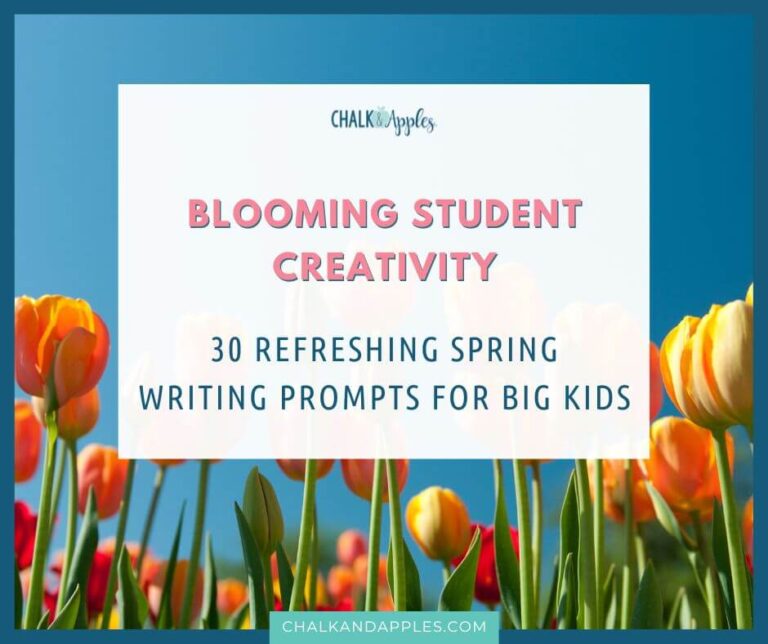
Blooming Student Creativity: 30 Refreshing Spring Writing Prompts for Big Kids

What are Text Structures Anchor Charts, and How Can Teachers Use Them to Their Advantage?
Shop teacher favorites.
Find ready-to-go lessons, activities, and organizational tools to simplify your life and help you fall back in love with your job.

Reading Digital Rotation Board with Timers (Editable)

Digital Rotation Boards for Reading & Math (Bundle)
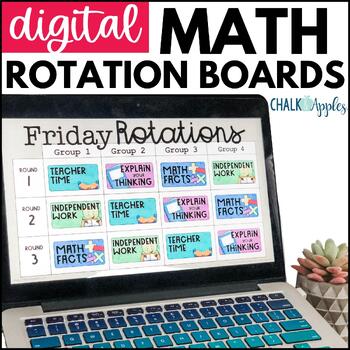
Math Digital Rotation Board with Timers (Editable)

Word Work for Big Kids: PRINTABLES for Vocabulary

Great Mail Race Complete Kit
Free teaching resources, join the newsletter.
Get teaching tips, resources, and freebies delivered right to your inbox once a week!
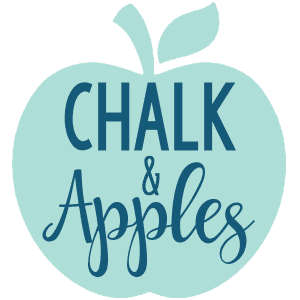
- Terms of Use
- Disclaimers
- Privacy Policy
- Resource Shop
- Access Purchases
The Community
We weren't meant to do this teaching life alone... we need each other. Join our Upper Elementary teacher community on Facebook for tips, ideas, and support from people who get it... teachers just like you!
Unleash Creativity with 4th Grade Narrative Writing Prompts
Are you looking to inspire creativity in your 4th grade students? Look no further! Narrative writing prompts are the perfect tool to ignite their imagination and enhance their writing skills. Whether you’re a teacher or a parent, using narrative writing prompts can help your child develop their writing habits, stimulate their expression of ideas, and foster a love for storytelling.
At SplashLearn, we understand the importance of engaging students in meaningful writing activities. That’s why our comprehensive learning program includes over 4,000 fun games and activities specifically designed for 4th graders. With our wide range of narrative writing prompts, your child will have endless opportunities to explore their creativity and improve their writing skills.
- Key Takeaways:
- Writing prompts are a great way to inspire creativity and develop writing habits in 4th grade students.
- Using narrative writing prompts specifically designed for 4th graders can engage students in meaningful writing activities and foster their love for storytelling.
- SplashLearn offers a comprehensive learning program with over 4,000 fun games and activities for 4th graders, including a wide range of narrative writing prompts.
- By incorporating narrative writing prompts into your child’s learning routine, you can ignite their imagination and enhance their writing skills.
- Engaging in regular writing activities with prompts can help your child develop their self-expression, communication skills, and vocabulary.
The Importance of Writing Prompts for 4th Graders
Writing prompts play a crucial role in the development of 4th grade students’ writing skills. These prompts serve as a starting point and provide the necessary inspiration for young writers to express their thoughts and ideas. By using narrative writing prompts specifically designed for 4th graders, teachers can engage students in meaningful writing activities that foster their love for storytelling and nurture their creativity.
- Encouraging Creativity and Vocabulary Development
Engaging narrative prompts for 4th graders spark creativity by inviting students to explore different characters, settings, and plotlines. These prompts encourage students to think critically and use their imagination to craft unique and compelling stories. Furthermore, narrative writing prompts help students expand their vocabulary as they search for the right words to bring their stories to life. Through the exploration of various prompts, students can enhance their language skills and develop a richer writing style.
- Developing Self-Expression and Communication Skills
Writing prompts provide 4th graders with a platform to express their thoughts, emotions, and experiences. They offer students the opportunity to communicate their ideas effectively and develop their own writing voice. By engaging with narrative prompts, students can practice articulating their thoughts and stringing together coherent sentences, thereby improving their communication skills. This also helps students build confidence in their abilities to express themselves through writing.
- Fostering a Joy for Storytelling
Engaging narrative prompts for 4th graders ignite a passion for storytelling within students. These prompts encourage students to think creatively and take risks with their writing. By providing a structure and a starting point, narrative prompts allow students to focus on crafting compelling stories and exploring their storytelling abilities. This not only enhances their writing skills but also fosters a love for storytelling that can last a lifetime.
Journaling as a Creative Writing Tool for 4th Graders
Journaling is an excellent way to nurture the creative writing skills of 4th graders. By regularly expressing their thoughts, dreams, and experiences through writing, students can enhance their writing abilities and develop a deeper understanding of themselves. Incorporating printable narrative writing prompts into journaling sessions provides structure and inspiration for young writers, helping them explore different writing styles and topics.
- Benefits of Journaling
- Improves writing skills: Journaling allows 4th graders to practice their writing consistently and develop their grammar, vocabulary, and sentence structure.
- Encourages self-expression: Through journaling, students can freely express their thoughts, emotions, and ideas, fostering creativity and self-awareness.
- Enhances critical thinking: Reflecting on their experiences and analyzing their thoughts in writing helps 4th graders develop critical thinking skills and problem-solving abilities.
- Promotes self-reflection: Journaling enables students to reflect on their personal growth, values, and goals, promoting self-discovery and self-reflection.
- Using Printable Narrative Writing Prompts
Printable narrative writing prompts can be a valuable resource in journaling sessions with 4th graders. These prompts provide students with specific topics or scenarios to write about, helping them overcome writer’s block and jumpstart their creativity. Teachers can choose prompts that align with the students’ interests or tie into the curriculum, encouraging engagement and exploration. By using prompts, 4th graders can learn to craft engaging narratives, develop their descriptive language, and experiment with different writing techniques.
Overall, journaling with printable narrative writing prompts is an effective way to encourage 4th graders to express themselves, improve their writing skills, and explore their creativity. It provides a structured framework for their writing journey while allowing them the freedom to explore their own thoughts and ideas. By incorporating journaling into the classroom and utilizing the power of prompts, teachers can foster a love for writing and help students develop their unique voices as young writers.
Exploring Descriptive Writing Prompts for 4th Graders
Descriptive writing prompts are a fantastic way to ignite the love for vivid details in 4th graders. By engaging their senses and encouraging them to paint vivid pictures with words, these prompts harness the power of descriptive language and help students bring their stories to life. Whether it’s describing a magical forest, a bustling city street, or a mouthwatering ice cream sundae, descriptive prompts challenge 4th graders to dig deep and create engaging narratives that captivate their readers.
- Using Prompts to Develop Descriptive Language Skills
Descriptive writing prompts provide an excellent opportunity for 4th graders to enhance their descriptive language skills. By prompting students to carefully observe and articulate the characteristics of people, places, objects, or events, these prompts encourage young writers to pay attention to details and use vivid language.
- Encourage students to use sensory language: Using prompts that require students to describe how something looks, sounds, smells, tastes, or feels can help them develop their descriptive language skills and create a multisensory experience for the reader.
- Promote the use of similes and metaphors: Descriptive prompts can also inspire students to use similes and metaphors to add depth and richness to their writing. Encourage them to compare objects or events to something else, helping readers visualize and connect with the description on a deeper level.
- Emphasize the importance of precise vocabulary: Descriptive writing prompts offer an opportunity for students to expand their vocabulary and choose words that accurately convey their thoughts. Encourage students to use specific adjectives, adverbs, and strong verbs to add precision and depth to their descriptions.
- Engaging 4th Graders in Descriptive Writing
Descriptive writing prompts can be engaging and exciting for 4th graders. By choosing prompts that pique their interest and spark their imagination, teachers can create a fun and stimulating writing environment that motivates students to explore their creative potential.
- Tap into their interests: Select prompts that align with 4th graders’ hobbies, favorite books, or personal experiences. By connecting writing prompts to their interests, students are more likely to be enthusiastic and engaged in the descriptive writing process.
- Create visual prompts: Visual prompts, such as images or videos, can serve as great sources of inspiration for descriptive writing. Show students captivating visuals and ask them to describe what they see, allowing them to explore their visual imagination and incorporate details into their writing.
- Provide real-world experiences: Take students on field trips or engage them in hands-on experiences that allow them to observe and interact with different environments. Encourage them to take notes and later use their observations as prompts for descriptive writing. This approach not only deepens their understanding of the world but also enriches their descriptive writing skills.
With the right mix of descriptive writing prompts and engaging strategies, 4th graders can unleash their creativity and develop their descriptive language skills. By encouraging them to delve into the world of details, teachers can inspire their young writers to create captivating narratives that transport readers to new and exciting places.
Unleashing Imagination with Fiction Writing Prompts for 4th Graders
When it comes to fostering creativity and storytelling skills in 4th grade students, fiction writing prompts are an excellent tool. These prompts provide young writers the freedom to explore their imaginations and create stories without the constraints of following a specific format. By using fiction writing prompts specifically designed for 4th graders, teachers can unleash the full potential of their students’ creative abilities.
With a wide range of prompts available, teachers can transport 4th graders to different worlds and challenge their creative thinking. They can encourage students to write about fantastical adventures, imaginary creatures, or intriguing mysteries. By doing so, these prompts not only inspire creativity but also improve writing skills and encourage concentration.
- Engaging Prompts to Ignite the Imagination
Here are some engaging fiction writing prompts that can ignite the imagination of 4th grade students:
- Imagine you wake up one morning and discover you have the ability to fly. Write a story about the adventures you have and the challenges you face.
- Write a story about a magical object that grants wishes. What would you wish for, and what happens when your wishes come true?
- Create a story about a time-traveling adventure. Where would you go and what would you do?
- Write a story about a hidden treasure and the quest to find it. What obstacles do the characters face along the way?
By using these prompts, teachers can encourage 4th graders to think outside the box, develop their storytelling skills, and have fun while writing. Fiction writing prompts provide an avenue for students to unleash their imagination and create captivating stories that showcase their unique voice.
Developing Critical Thinking with Opinion Writing Prompts for 4th Graders
Opinion writing prompts are a valuable tool for 4th graders to develop critical thinking skills and express their thoughts and ideas in a structured manner. These prompts encourage students to form opinions, present arguments, and support their claims with evidence. By engaging in opinion writing, 4th graders can enhance their persuasive writing abilities and learn to think critically about various topics.
- Why Opinion Writing Prompts are Important
Opinion writing prompts provide 4th graders with an opportunity to explore different perspectives on relevant issues. They encourage students to analyze information, consider different points of view, and develop their own well-reasoned opinions. By engaging in opinion writing, students learn to evaluate evidence, strengthen their logical reasoning skills, and communicate their thoughts effectively.
- Engaging 4th Graders with Opinion Writing Prompts
To make opinion writing prompts more engaging for 4th graders, teachers can choose topics that are relatable and interesting to students. For example, prompts about favorite books, hobbies, or school rules can spark their enthusiasm and encourage them to share their opinions. Additionally, teachers can facilitate classroom discussions where students can express their viewpoints, listen to others, and respectfully debate different perspectives.
Using opinion writing prompts not only develops critical thinking skills but also fosters empathy and understanding among 4th graders. It allows them to appreciate diverse opinions and learn to express their thoughts in a respectful manner. By providing a supportive environment for opinion writing, teachers can empower 4th graders to become confident and articulate communicators.
Infusing Fun into Narrative Writing with Engaging Prompts for 4th Graders
When it comes to narrative writing, making it fun and engaging for 4th graders is key to unlocking their creativity and storytelling abilities. By using prompts that incorporate humor, unique scenarios, and imaginative elements, you can create a writing environment that sparks their interest and ignites their imagination.
- 1. Prompts with Humor
Integrating humor into writing prompts can make the process enjoyable for 4th graders. You can create prompts that involve funny situations, playful characters, or unexpected twists in the story. This not only helps to make writing more enjoyable but also encourages students to think outside the box and explore their sense of humor.
- 2. Unique Scenarios
Engaging narrative prompts can also involve unique scenarios that transport 4th graders to different worlds and challenge their creative thinking. You can prompt students to imagine themselves as superheroes, explorers in outer space, or even time travelers. These prompts allow students to think beyond their everyday experiences and tap into their imagination.
- 3. Imaginative Elements
Introducing imaginative elements into narrative writing prompts can fuel the creativity of 4th graders. You can prompt students to create stories involving magical creatures, talking animals, or enchanted objects. These prompts encourage students to think creatively and stretch their imagination to create captivating and imaginative stories.
By infusing fun into narrative writing with engaging prompts, you can not only inspire creativity but also cultivate a love for storytelling in 4th graders. These prompts provide a platform for students to think creatively, develop their writing skills, and express their unique ideas and perspectives.
Enhancing Writing Skills with Informative Writing Prompts for 4th Graders
Informative writing prompts are an excellent way to help 4th grade students enhance their writing skills while conveying valuable information. These prompts encourage students to engage in descriptive writing, hone their critical thinking skills, and organize their thoughts in a logical manner. By providing informative writing prompts, teachers can foster students’ ability to effectively communicate information through their writing.
- Benefits of Informative Writing Prompts for 4th Graders
- Develop descriptive writing skills: Informative prompts challenge students to vividly describe an object, person, or event, allowing them to practice using descriptive language effectively.
- Enhance critical thinking: Writing informative pieces requires students to analyze and synthesize information, encouraging the development of critical thinking skills.
- Organize thoughts logically: Informative prompts help students structure their writing in a logical sequence, fostering the ability to present information in a clear and coherent manner.
- Expand vocabulary: Exploring informative writing topics exposes students to new vocabulary and allows them to incorporate it into their writing, expanding their word knowledge.
- Examples of Informative Writing Prompts for 4th Graders
To give you an idea of the types of informative writing prompts suitable for 4th graders, here are a few examples:
- Write an informative essay about your favorite animal, including details about its habitat, diet, and interesting facts.
- Compose a report on an historical figure, explaining their contributions and impact on society.
- Describe a science experiment you conducted, detailing the steps, materials used, and your findings.
- Write a how-to guide on a favorite hobby or activity, providing step-by-step instructions and tips.
These prompts prompt students to gather information, organize their thoughts, and present it in an informative and engaging manner.
Exploring the World of Animals with Animal Creative Writing Prompts for 4th Graders
Animal creative writing prompts offer a fantastic opportunity for 4th graders to tap into their love for animals and discover the joy of storytelling. These prompts encourage students to think from an animal’s perspective, describe their unique traits, and create captivating storylines. By using animal creative writing prompts, teachers can inspire a deep connection and appreciation for the animal kingdom while fostering their students’ creativity and writing skills.
One popular animal creative writing prompt is to imagine being an animal for a day. Students can choose their favorite animal and write a story from the animal’s point of view, describing their daily activities, interactions with other animals, and the challenges they face. This prompt encourages students to think critically and develop empathy as they explore the animal’s thoughts, feelings, and experiences.
- Benefits of Animal Creative Writing Prompts:
- Encourage imagination and creativity
- Develop descriptive writing skills
- Promote critical thinking and empathy
- Enhance vocabulary and language development
- Foster a love for storytelling and animals
Another engaging animal creative writing prompt is to create a new species of animal. Students can let their imaginations run wild and invent a unique animal with fascinating characteristics, habitats, and behaviors. They can describe the animal’s physical appearance, diet, and survival strategies, as well as its role in the ecosystem. This prompt allows students to explore their creativity and knowledge about animals while practicing descriptive writing and world-building skills.
Animal creative writing prompts provide endless possibilities for 4th graders to explore their creativity, enhance their writing skills, and develop a deeper understanding of the animal world. By incorporating these prompts into their teaching, educators can create a playful and inspiring learning environment that engages students and encourages them to express themselves through storytelling.
Tapping into the World of Poetry with Poetry Writing Prompts for 4th Graders
Poetry writing prompts offer a wonderful opportunity for 4th graders to explore the rich and expressive world of poetry. These prompts not only encourage students to engage their creative thinking and language skills but also provide them with a platform to express their emotions and play with words. By introducing poetry writing prompts, teachers can foster a love for poetry and help students develop their writing abilities in a unique and artistic way.
When using poetry writing prompts, teachers can encourage students to experiment with different poetic forms such as haiku, acrostic, or free verse. This allows 4th graders to explore different structures and rhythms, helping them understand the various elements of poetry. Whether they choose to write about nature, personal experiences, or imaginative scenarios, these prompts provide the opportunity to explore emotions and thoughts through the beauty of language.
- Benefits of Poetry Writing Prompts for 4th Graders
- Promote creativity: Poetry writing prompts give 4th graders the freedom to express their unique ideas and emotions, allowing them to tap into their creative potential.
- Develop language skills: By playing with words, students can enhance their vocabulary, improve their grammar, and develop a deeper understanding of language.
- Encourage self-expression: Poetry provides a platform for students to express their thoughts, feelings, and perspectives in a creative and artistic way.
- Foster critical thinking: Writing poetry prompts 4th graders to think deeply and make intentional choices about their words, imagery, and message.
By incorporating poetry writing prompts into the curriculum, teachers can create an engaging and inspiring learning environment where 4th graders can explore their unique voices, feelings, and imaginations. Poetry writing allows students to develop their writing skills while also connecting with the beauty and power of language.
Effective Strategies for Teaching Creative Writing to Year 4 Students
Teaching creative writing to Year 4 students requires a thoughtful approach that engages their young minds and fosters their writing skills. By implementing effective strategies, you can create a supportive and inspiring environment that nurtures the love for writing in your students. Here are some strategies for teaching creative writing to Year 4 students:
- 1. Provide Creative Writing Prompts
Start by providing your students with creative writing prompts. These prompts serve as a springboard for their imagination and help them generate ideas for their stories. Choose prompts that are age-appropriate and engaging, allowing students to explore various genres and writing styles.
- 2. Use Visual Aids
Incorporate visual aids into your lessons to stimulate creativity and enhance the writing experience. Show your students images, videos, or real-life objects that can inspire their writing. Encourage them to observe and describe details, helping them develop their descriptive language skills.
- 3. Encourage Brainstorming
Promote brainstorming sessions where students can freely share their thoughts and ideas. Create a supportive and non-judgmental environment where every idea is valued. Encourage collaboration and peer feedback, allowing students to build on each other’s ideas and expand their creativity.
- 4. Teach the Elements of Storytelling
Introduce your students to the essential elements of storytelling, such as plot, character development, setting, and conflict. Teach them how to create engaging storylines and develop well-rounded characters. By understanding the structure and components of a good story, students can improve their storytelling skills.
- 5. Make Writing Fun
Make the writing process enjoyable by incorporating fun activities and games. For example, you can organize writing contests, create storytelling circles, or even use technology tools to enhance the writing experience. By making writing a fun and interactive activity, you’ll keep your students engaged and motivated.
- 6. Provide Feedback
Give constructive feedback on your students’ writing to support their growth and improvement. Focus on praising their strengths and areas where they excel, while also providing specific suggestions for improvement. Consider using rubrics or checklists to provide clear expectations and guide their writing development.
By implementing these strategies in your creative writing lessons, you can effectively teach Year 4 students and help them develop their writing skills while nurturing their creativity and love for writing.
Making Writing Fun for Grade 4 Students
When it comes to teaching writing to grade 4 students, making it fun and engaging is key. By incorporating various strategies, teachers can create an enjoyable learning environment that sparks creativity and enhances writing skills. Here are some effective strategies for making writing fun for grade 4 students:
- 1. Give Students Choice
Allowing students to choose their own writing topics gives them a sense of ownership and helps foster their creativity. Let them explore their interests and write about subjects that excite them. This freedom of choice will make writing more enjoyable and personal for grade 4 students.
- 2. Incorporate Visual Elements
Visual aids can add an element of excitement to writing activities. Use colorful posters, images, and illustrations to inspire students’ imagination and provide visual cues for their writing. Visual elements not only make writing more fun but also help students develop their descriptive skills.
- 3. Use Prompts and Interactive Games
Engage grade 4 students by using writing prompts and interactive games. Prompts provide a starting point for their writing and can be tailored to their interests. Interactive games, such as online writing challenges or writing competitions, create a sense of friendly competition and make writing a fun group activity.
- 4. Connect Writing to Real-Life Experiences
Make writing relevant to grade 4 students’ lives by connecting it to real-life experiences. Encourage them to write about their favorite hobbies, vacations, or memorable events. By relating writing to their own experiences, students will find it more meaningful and enjoyable.
By implementing these strategies, teachers can make writing a fun and engaging activity for grade 4 students. Remember, when students enjoy writing, they are more likely to develop their skills and become confident writers.
Providing Feedback to Year 4 Students for Writing Improvement
Feedback plays a crucial role in helping Year 4 students improve their writing skills. By providing constructive feedback, teachers can guide students towards becoming better writers. Here are some effective strategies for providing feedback on writing:
- 1. Praise their strengths:
When reviewing students’ writing, it is important to acknowledge their strengths and highlight areas where they excelled. By focusing on their strengths, students feel encouraged and motivated to continue improving their writing skills.
- 2. Identify areas for improvement:
In addition to praising students’ strengths, it is equally important to identify areas where they can improve. Providing specific suggestions and examples can help students understand what they need to work on and how to enhance their writing.
- 3. Use rubrics or checklists:
Using rubrics or checklists can provide clear expectations to students and guide their writing development. These tools enable teachers to evaluate students’ writing based on specific criteria, ensuring consistent and fair feedback.
- 4. Encourage self-reflection:
Encouraging students to reflect on their own writing can be a valuable learning experience. By asking students to evaluate their own work and identify areas for improvement, they become more self-aware and develop critical thinking skills.
By implementing these strategies, teachers can provide effective feedback that supports the growth of writing skills in Year 4 students. Feedback not only helps students improve their writing but also boosts their confidence and fosters a love for writing.
Writing prompts are a valuable tool for fostering creativity and enhancing writing skills in 4th grade students. These prompts provide a starting point for young writers, encouraging them to explore their imagination and express their ideas in a structured manner. By incorporating a variety of narrative writing prompts specifically designed for 4th graders, teachers can engage students in different forms of writing and nurture their storytelling abilities.
Throughout this article, we have explored the importance of writing prompts for 4th graders in developing self-expression, communication skills, and critical thinking. Journaling with printable narrative writing prompts can help students boost their flow of ideas and reflect on their thoughts and experiences. Descriptive prompts enhance students’ love for details and help them develop their descriptive language skills. Fiction, opinion, and animal creative writing prompts engage students in different types of writing and encourage them to think creatively and express their thoughts and opinions. Poetry writing prompts introduce students to the world of poetry and foster their creative writing and language skills.
Teaching creative writing to Year 4 students requires effective strategies such as providing prompts, using visual aids, encouraging brainstorming, making writing fun, and providing constructive feedback. By implementing these strategies, teachers can create a supportive and inspiring environment that nurtures the love for writing in 4th grade students. Ultimately, writing prompts, combined with thoughtful instruction and engaging activities, can help students unleash their creativity, enhance their writing skills, and develop a lifelong love for writing.
- Source Links
- https://www.splashlearn.com/blog/fourth-grade-writing-prompts/
- https://www.prodigygame.com/main-en/blog/writing-prompts-for-kids/
- https://kidsmartapp.co.uk/content/writing/creative-writing/unleashing-creativity-a-guide-to-teaching-year-4-students-the-art-of-creative-writing/

Reading & Math for K-5
- Kindergarten
- Learning numbers
- Comparing numbers
- Place Value
- Roman numerals
- Subtraction
- Multiplication
- Order of operations
- Drills & practice
- Measurement
- Factoring & prime factors
- Proportions
- Shape & geometry
- Data & graphing
- Word problems
- Children's stories
- Leveled Stories
- Context clues
- Cause & effect
- Compare & contrast
- Fact vs. fiction
- Fact vs. opinion
- Main idea & details
- Story elements
- Conclusions & inferences
- Sounds & phonics
- Words & vocabulary
- Reading comprehension
- Early writing
- Numbers & counting
- Simple math
- Social skills
- Other activities
- Dolch sight words
- Fry sight words
- Multiple meaning words
- Prefixes & suffixes
- Vocabulary cards
- Other parts of speech
- Punctuation
- Capitalization
- Narrative writing
- Opinion writing
- Informative writing
- Cursive alphabet
- Cursive letters
- Cursive letter joins
- Cursive words
- Cursive sentences
- Cursive passages
- Grammar & Writing
Breadcrumbs

Download & Print Only $6.89
Informative writing prompts for grade 4
Essay writing.
Students are given a prompt to write an informative essay; one topic per worksheet.

Transportation
Peer pressure
Role models
Extreme weather
Members only:
Space exploration
Healthy eating
What is K5?
K5 Learning offers free worksheets , flashcards and inexpensive workbooks for kids in kindergarten to grade 5. Become a member to access additional content and skip ads.

Our members helped us give away millions of worksheets last year.
We provide free educational materials to parents and teachers in over 100 countries. If you can, please consider purchasing a membership ($24/year) to support our efforts.
Members skip ads and access exclusive features.
Learn about member benefits
This content is available to members only.
Join K5 to save time, skip ads and access more content. Learn More
- Forgot Password?

IMAGES
VIDEO
COMMENTS
K5 Learning offers free worksheets, flashcards and inexpensive workbooks for kids in kindergarten to grade 5. Become a member to access additional content and skip ads. These narrative writing prompts are aimed at topics that will spark the imagination of grade 4 students.
57 Narrative Writing Prompts For 4th Grade. Journaling is an important part of self-exploration and deep thinking. Giving students a list of prompts to choose from allows them to choose which parts of themselves to explore, and helps keep their writing headed in a certain direction. Below, you'll find a list of narrative writing prompts to ...
Write about a time when you helped someone complete a task. 17. Describe a time when you participated in the school's science fair. 18. Share a story about a time that you assisted your parents in preparing dinner. 19. Tell what you like most and least about responding to narrative writing prompts for 4th grade students. 20.
Oct 6, 2023. Fourth grade is a time for students to continue to hone their writing chops as they put to use the skills they've learned and gain confidence in their abilities. We've collected this list of fourth grade writing prompts—including opinion, persuasive, informational, and narrative—to spur your students' imaginations and get ...
Small moments writing: write in great detail about a specific moment. Point of view: first, second and third person. Writing personal narratives: organize and write a personal recollection. Narrative writing practice: tying together characters, setting and plot. Narrative writing prompts: creative prompts for grade 4 students
something really strange had grown there. 7. Write a story about what it would be like if you woke up one morning with wings. 8. On your birthday, a strange-looking lady came to you door and handed you a wrapped present. You rattled it. It made a noise. Write a story about this present. 9.
Tell a story about what you would wish for and why. Write a story called, "The Luckiest Day of My Life.". Imagine you went to the zoo and could take home any animal for the day. Tell a story about your time together. Write a silly story that uses these words: airplane, grapes, elephant, and book.
Adventures Await Narrative Writing Prompts. Tell a story about friends going to a secret island full of magical creatures. Write about a forest where time gets mixed up, and you have to solve a mystery. Describe a journey to a volcano where you find a special treasure. Imagine rescuing a special animal from an evil person's castle.
Get ready for a giggle-packed writing period with writing prompts for 4th grade! 1. Your homework was eaten by a dog. Write a story to convince your teacher. 2. Write a story using 5 words: funny, bird, sleep, guitar and pajamas. 3. Imagine you woke up and saw a giant sleeping next to you. Narrate the story.
Narrative Writing Prompts for 4th Grade. Narrative writing allows 4th-grade students to delve into their personal experiences and bring out descriptive details. It's an excellent avenue for them to improve their narrative essay skills. Describe your perfect day. Write about the time you met your best friend.
According to the Common Core State Standards Initiative, fourth-grade writing should include opinion pieces, informative or explanatory texts, and narratives about real or imagined experiences. Additionally, a fourth-grade writing curriculum should include short research projects. These writing prompts offer diverse forms of inspiration for ...
Creative writing allows students to tap into their imagination. As 4th graders begin thinking more abstractly, creative writing provides an opportunity for them to stretch their minds. Benefits include: Strengthens ability to develop stories and express ideas. Allows students to explore interests more deeply.
How Night Zookeeper can help. Night Zookeeper makes writing fantastically fun for children aged six to twelve! Our language arts program for kids can help to improve your child's skills while keeping them engaged, focused, and entertained! Our extensive range of writing activities provide children with thousands of creative writing prompts ...
Use these inspiring and creative 4th grade writing prompts to get older elementary kids excited about writing! From funny prompts to prompts for writing poetry, there's something for everyone.
Reduce screen time: Offer an alternative to passive entertainment and encourage creative expression. 50 Exclusive 4th Grade Writing Prompts. Writing helps stimulate and organize thoughts in 4th-grade children. They make them better off expressing whatever they have in their mind and feel a little less burdensome.
This set of writing prompts has been developed with fourth graders in mind and is sure to meet the literacy skills and lessons needed in fourth grade. The prompts contain a range of activities aimed at teaching essential skills such as creativity, sentence construction, narrative writing, opinion expression, descriptive writing, and so much more.
Narrative writing prompt: Silly superpower. Grade 4 Writing Worksheet. Write a story about a character who has a silly superpower - like he can only be invisible when no one is looking! Your story should have a beginning, a middle and an end. Also be sure to describe the story's setting!
Look no further! Our 4th Grade Writing Prompts with Passages PDF is here to help. This resource enables students to explore both reading and writing skills simultaneously, fostering their creativity and critical thinking abilities. ... such as narrative, opinion, or expository writing. These prompts encourage students to think deeply, engage ...
Have your class include how their story explains why kindness is important at the end of their written work. Once the writing is complete, have them draw a visual representation of the story they wrote. Take everyone's work and publish a classbook with all of the reasons why helping others out is important. 4.
4th grade narrative writing! These narrative writing prompts are a must-have for teaching story writing. If you want fun and engaging prompts for writing personal narratives, fictional stories, and recounts, then this is perfect for your 4th grade writing lessons or writing centers.This story writin...
In this blog post I share 5 different categories of narrative writing prompts, each with 11 prompts. That means when you download it you will have FIFTY-FIVE writing prompts to use all year long. Fill out the form below to have all 55 sent to you in an easy, printable list that will help simplify your lesson planning! Family Narrative Writing ...
Key Takeaways: Writing prompts are a great way to inspire creativity and develop writing habits in 4th grade students. Using narrative writing prompts specifically designed for 4th graders can engage students in meaningful writing activities and foster their love for storytelling.
Students will use these writing pages for a narrative writing about their Solar Eclipse experience. Students and parents will love to have this as a keepsake of this special moment for many years to come! All writing pages include a checklist to encourage students to self-edit. I have lots of amazing resources coming so be sure to click the ...
Essay writing. Students are given a prompt to write an informative essay; one topic per worksheet. Informative writing prompts. Transportation. Peer pressure. Change. Childhood. Patience. Role models.